Architect Daniel Libeskind on the



Tree of Life chief architect Daniel Libeskind recently returned to Pittsburgh to address a crowd of more than 450 at Carnegie Mellon University on Thursday, Nov. 17. His talk focused on architecture and memory, a central theme in many of his designs. He discussed his work at the Jewish Museum in Berlin, the Military History Museum in Dresden, the World Trade Center in New York, the National Holocaust Monument in Ottawa, Canada, and his designs for the new Tree of Life building.
Before leaving the city, Libeskind spoke with the Chronicle.



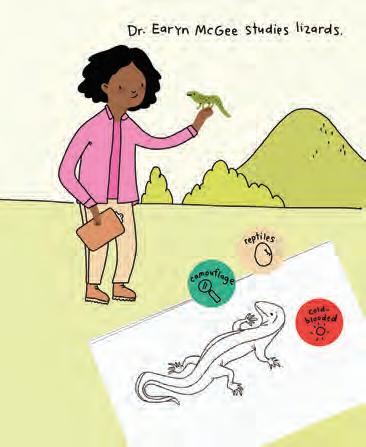
The interview was edited for length
and clarity.
I think the No. 1 part of the process is the site, the uniqueness of each place. That’s where I start that is consistent from every project — to understand what it is, where it is and what it signifies. It’s about drawing inspiration from that site, which means what happened on it. We look at what is the community around it, what is its capacity to tell a story, what has been
By Toby Tabachnick | Editor
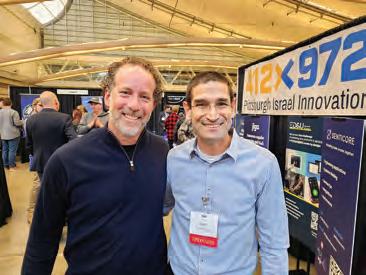

Aformer employee of the Jewish Association on Aging was arrested on charges of stealing almost $60,000 from the organization.
Marc Peagler, a former facilities manager at Weinberg Terrace, is being held in the Allegheny County Jail, awaiting his arraignment, which is scheduled for Dec. 8.


Court documents show that while Peagler was employed by the JAA, he hired thirdparty contractors to do maintenance and approved invoices. He is accused of billing the JAA for work that never was done and cashing the checks for personal use.
Peagler was hired in January 2019 and was
Can you talk about how and from where you draw inspiration for your designs, especially in relation to the Tree of Life project?
Thanks to Discovery Day 2022, a program of the Pittsburgh Robotics Network, and the efforts of 412x972, eight Israeli companies traveled to western Pennsylvania and participated in the day-long gathering.
“This is the first time ever that so many Israeli companies are coming into town for such a great show,” Inbar said.
Held at the David L. Lawrence Convention Center, Discovery Day welcomed students, CEOs and robots. As the latter entertained attendees, engineers and executives conversed and strategized potential partnerships.

Creating those connections is part of Discovery Day’s goal, explained Jennifer M. Apicella, PRN’s program director.
“We wanted to make this very hightech forward-thinking industry community available to all,” she said. “There are oppor tunities available at these companies for jobs. There are opportunities for businesses to come and learn how to adopt this kind of technology. But none of that can happen unless the public understands truly what that opportunity is.”
Throughout the day, busloads of young people, educators and community members arrived at the convention center, ascended the stairs and made their way between booths.
ince joining 412x972 Pittsburgh Israel Innovation months before the pandemic, its executive director, Gal Inbar, has helped dozens of Israeli and Pittsburgh companies partner on innovative projects. A Nov. 16 event was an opportunity to expand on that work.p Alex Geht holds a Testa Seat.
Amir Molad, founder and CEO of AmarelUS, a company that provides professional services for manufacturing and technology industries, relocated with his family from Israel to New Jersey months ago. Discovery Day was his first time in Pittsburgh.

“The people that you meet here are wonderful,” Molad said. “They are extremely friendly and all of them are trying to assist and help in any way. It’s amazing.”
Sarah Wish, the program coordinator of Tikkun Olam Makers, said Discovery Day was a chance to inform the public about the Israeli-based company’s efforts to create and disseminate “affordable solutions to neglected challenges of people living with disabilities, the elderly and the poor.”
As visitors passed her stand, Wish related information about an upcoming global innovation challenge offered by the company.
“People can support someone with a disability in their community who expe riences a neglected challenge and create a solution for them, then document it, [and] upload it to our platform,” Wish said. “And then anyone anywhere will be able to access
their solution and use it.”

Alex Geht, the founder and CEO of Testa Seat, showed passersby the innovative adaptive seats his Israeli-based company makes for children and adults with special needs.
Geht said his process involves working with clinicians, measuring clients and then 3-D printing the seats based on the clients’ abilities.
“In this way, we are providing very custom ized, unique, safe and very affordable [seats] in a very short time,” he said.
Almog Zeron, co-founder and CEO of XYZeron, told the Chronicle that though this wasn’t his first time in Pittsburgh, he was excited to learn and spark new partnerships.
“We have a group of talents in Israel, and what’s nice is we’re always looking for a nice project with good partners,” Zeron said.
XYZeron is an Israeli-based company that develops smart products and provides solutions and consulting to the Israeli and global market. Helping companies, like XYZeron, is part of 412x972’s mission, Inbar explained.
“We build business bridges between the
p Sarah Wish of Tikkun Olam Makers

communities and strengthen the bonds between Pittsburgh and Israel,” he said. And though 412x972 is committed to ensuring beneficial economic outcomes for its partners, the initiative is also concerned with “building relations and connecting people.”
“We’re here as a resource,” Andrew Rabin, 412x972’s co-founder and board chair, said.
The Jewish Federation of Greater Pittsburgh helped establish 412x972 about three years ago. Since then, the initiative has brought together 80 Israeli and Pittsburgh companies by focusing on the latter region’s strengths, including robotics, autonomous navigation, machine learning, AI and life sciences, Rabin said.

Even so, Inbar said, there’s “so much more work to be done.”
“We’d like to serve more companies, more manufacturing, supply chain, more tech, mid-market, and just get the word out that we’re here as a resource,” Rabin said. “We’d love to have conversations.” PJC
Adam Reinherz can be reached at areinherz@pittsburghjewishchronicle.org.
subscriptions@pittsburghjewishchronicle.org
Jim Busis, CEO and Publisher 412-228-4690 jbusis@pittsburghjewishchronicle.org
EDITORIAL
Toby Tabachnick, Editor 412-228-4577 ttabachnick@pittsburghjewishchronicle.org
Andy Gotlieb, Contributing Editor
Evan H. Stein, Board Chair Gayle R. Kraut, Secretary
Evan Indianer, Immediate Past Chair Gail Childs, Dan Droz, Malke Steinfeld Frank, Seth Glick, Tammy Hepps, Cátia Kossovsky, David Rush, Charles Saul

GENERAL COUNSEL Stuart R. Kaplan, Esq.
Adam Reinherz, Staff Writer 412-687-1000 areinherz@pittsburghjewishchronicle.org
David Rullo, Staff Writer 412-687-1047 drullo@pittsburghjewishchronicle.org
ADVERTISING
Phil Durler, Senior Sales Associate 724-713-8874 pdurler@pittsburghjewishchronicle.org
Manuscripts, letters, documents and photographs sent to the Pittsburgh Jewish Chronicle become the property of this publication, which is not responsible for the
such items.
return
Refugee Shabbat, Weinberg said, Dor Hadash was eager to find more tangible ways to help the immigrant community.
By David Rullo | Staff WriterFour years after the massacre at the Tree of Life building, Congregation Dor Hadash remains steadfast in its commitment to welcoming the stranger.
The congregation continues to participate in Refugee Shabbat, a national initiative of HIAS. After the Pittsburgh synagogue shooting, it was widely reported that the gunman targeted Dor Hadash because of its participation in that program.
If the accused murderer’s intent was to break the resolve of the congregation, he failed.
“If anything, we’ve doubled down,” said Rich Weinberg, head of Dor Hadash’s social action committee.
As proof of that commitment, earlier this year Dor Hadash became one of several congrega tions working closely with Jewish Family and Community Services in its Community Sponsorship Program, a collaborative effort to support refugees.
The congregation, Weinberg explained, has long worked with JFCS. In fact, it was during an event honoring Leslie Aizenman, JFCS’ former director of refugee programs, that Dor Hadash learned about the Community Sponsorship Program being developed at the time.
In addition to participating in the annual
“The opportunity to really work with an indi vidual family to help them resettle was really exciting to a lot of people, and it really generated a great deal of interest on the part of members of the congregation,” he said.
More than 30 congregation families, totaling more than 40 volunteers, have received over 45 hours of training from JFCS and have obtained the clearances needed to work with families.
The preparation paid off in mid-September when a family from the Democratic Republic of the Congo arrived from Zambia, where they lived for many years, Weinberg said.

The volunteers helped the family find afford able housing in the city, furnish their new home, stock their pantry and obtain cleaning supplies.
“We tried to think of everything a family would need when they come and make it nice for them on their first day when they arrive,” said Eve Wider, past social action committee chair who serves as part of the coordinating committee with Weinberg and other volunteers.
The congregation also picked the family up from the airport when they arrived and provided dinner on their first night in Pittsburgh.
Dor Hadash has made a yearlong commit ment to the family and continues to assist as they adjust to life in America. That assistance has included helping the family with every thing from getting on the food stamp program
to making sure they know how appliances work and how to use the bus. Volunteers have taken the family to medical appointments and gone on walks in local parks, Wider said.
“We’ve been actively involved in helping them navigate this whole new culture,” Weinberg said, “with the aim of helping them as rapidly as possible become self-sufficient, employed, able to manage their money and manage a budget.”
The Refugee Community Sponsor Program has three goals, according to JFCS Refugee Sponsor Coordinator Alina Harbourne: encourage the community to become more involved in welcoming refugees and provide support; help communities be more welcoming and accepting of diversity; and help resettle ment agencies like JFCS increase their capacity to support their refugee clients.
Harbourne said that any organization or group of individuals can become sponsors, but they must go through the requisite training and obtain clearances.
And while there are some financial obliga tions required, Harbourne said that the focus is more on the support that the volunteers can give providing core services that refugees require to start a new life.
“We don’t want the financial side to stop any group from wanting to help out,” Harbourne said. “That being said, when refugees arrive, they receive very little financial support from the U.S. government and if sponsorship groups are able to do some fundraising, it really helps not only for the
financial security of the family they’re supporting, but it can also help things like the cost of using an interpreter to help communicate with the family.”
Immigrants and refugees are under a lot of pressure to become self-sufficient within their first 90 days, she noted.
“It’s a lot of stress. There’s a lot of anxiety,” she said.
The Community Sponsors Program is a way to help bridge that journey, Harbourne said, adding that the program aligns with the mission of JFCS to help refugees and immigrants thrive in their new communities and feel welcome.
Participating in the program has been an amazing experience for the congregation, she said.
“I would really encourage people in Pittsburgh and around the country to think about doing it,” she added, “because there are, thankfully, refu gees coming into the country again, and there’s a huge amount of need, sadly.” PJC
David Rullo can be reached at drullo@ pittsburghjewishchronicle.org.
Welcome to Providence Point, a 62+ Life Plan Community designed especially for you—for the way you live now, with the added peace of mind you want for your future. We put wellness and exceptional healthcare* at the center of all we do, along with offering spacious residences and unparalleled amenities.

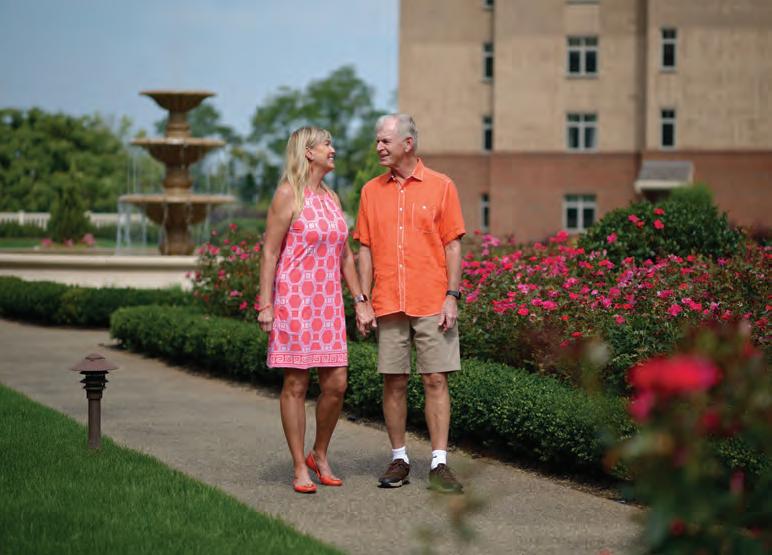
The retirement you envisioned is here.
Submit calendar items on the Chronicle’s website, pittsburghjewishchronicle.org. Submissions also will be included in print. Events will run in the print edition beginning one month prior to the date as space allows. The deadline for submissions is Friday, noon.
SUNDAYS, NOV. 27 – JAN. 8
Join a lay-led online Parashah study group to discuss the week’s Torah portion. No Hebrew knowledge is needed. The goal is to build community while deepening understanding of the text. 8:30 p.m. For more information, visit bethshalompgh.org.
MONDAYS, NOV. 28 – JAN. 9
Join Congregation Beth Shalom for a weekly Talmud study. 9:15 a.m. For more information, visit bethshalompgh.org.
MONDAYS, NOV. 28 – MAY 15
Understanding the Torah and what it asks of us is one of the most important things a Jew can learn. But most Torah classes begin in Genesis and never finish the first book. If you want a comprehensive overview of the whole Torah, Torah 1 is the course for you. In the first year of this two-year Zoom course, Rabbi Danny Schiff will teach Genesis, Exodus and the first half of Leviticus. In the second year, he will complete Leviticus and cover Numbers and Deuteronomy. $225. 9:30 a.m. foundation. jewishpgh.org/torah-1.
Write letters to voters with NCJW PA (Philadelphia and Pittsburgh Sections) and Vote Forward. Writing letters to voters is one of the most effective ways

to help increase election turnout. 12 p.m. Anathan House, 1620 Murray Ave. votefwd.org/ncjwpgh
Tune in as Jewish Federation of Greater Pittsburgh Foundation Scholar Rabbi Danny Schiff facilitates a virtual lecture with Tal Becker, legal adviser of the Israeli Ministry of Foreign Affairs. This year marks 75 years since the UN Partition Plan took place on Nov. 29, 1947. This event will focus on the historic partition plan and how the Arab nations’ rejection of the plan and the existence of the state of Israel is still relevant today. This is the first of three sessions in the “Israel at 75 Learning Sessions.” $12. Noon. jewishpgh.org/ event/75-years-since-un-partition-plan.
Join New Light Congregation for the next installment of its lecture series, “Hasidic Dynasty Native to Pittsburgh: Its rabbis, history, and music.” Morton Milch will discuss the dynasty of Hasidic rabbis who founded a community in Pittsburgh known as the “The Pittsburghers,” under Rabbi Yosef Leifer in 1924. 7 p.m. New Light at Beth Shalom, Beacon Street and Shady Avenue. Free, but you must register by emailing janet@newlightcongregation.org.
If you are experiencing fertility challenges and need support, join the Jewish Fertility Foundation for its Infertility Support Group led by a therapist who specializes in this area. Free. Zoom. 7 p.m. jewishfertilityfoundation.org/support.





Registration is now open for “Melton Core 1: Rhythms and Purposes of Jewish Living.” This
25-lesson course will take you through the year’s cycle — the life cycle traditions and practices that bind us together. Explore not just the what is and how is of Jewish living, but the why is that go with them. 7 p.m. $300 per person, per year (25 sessions), includes all books and materials. Virtual. foundation. jewishpgh.org/melton-core-1.
THURSDAY, DEC. 1
Join the Jewish Federation of Greater Pittsburgh for the first of three E3 Sessions and Reconnect, Restore, and Reimagine together. In the first session, Reconnect at the E3 Speakeasy, participants will be able to make and enjoy three cocktails with Pittsburgh’s most fun and engaging mixologist Angel Sipe. $36. 7 p.m. The Goldmark, 4517 Butler St. jewishpgh.org/event/reconnect-at-the-e3-speakeasy.
Calling musical kids of all levels. Temple Sinai is hosting a special workshop for fifth- through 12th-graders interested in singing and/or playing instruments with singer/songwriter Alan Goodis. After the workshop, the teens will be featured in Goodis’ concert at Temple Sinai that evening. Free and open to the public. Dinner included. 4:30 p.m. Contact Drew Barkley with questions or to register at Drew@TempleSinaiPGH.org or 412-4219715, ext. 111.
Join Temple Sinai for a special evening of music with guest performer Alan Goodis. Goodis is a touring Jewish musician playing over 150 events a year. Free and open to the public. 7:30 p.m. Register at templesinaipgh.org
MONDAY, DEC. 5
Join Beth El Congregation of the South Hills for First Mondays with Rabbi Alex. Abby Mendelson presents, “I Never Kill on Shabbos: The Rise and Fall of Jewish Gangsters in America.” RSVP by Nov. 25. 11:30 a.m. $7 per person. bethelcong.org

Join Classrooms Without Borders for a post-film discussion of “The Partisan with the Leica Camera” with Yael Perlov and Simon Lavee and moderated by Avi Ben Hur. 3 p.m. cwbpgh.org/event/postfilm-discussion-the-partisan-with-the-leica-camerawith-yael-perlov-simon-lavee-moderated-byavi-ben-hur.
Join Classrooms Without Borders and Rabbi Jonty Blackman as they light the lights of our menorah and celebrate the miracle of Chanukah. Of Maccabees and Miracles will explore some of the lesser-known stories behind the Chanukah traditions. 4 p.m. cwbpgh.org/event/of-maccabees-and-miracleswith-rabbi-jonty-blackman.
Join the JCC for a Mini-Mitzvah Day Blood Drive Schedule your lifesaving appointment at either the South Hills or Squirrel Hill location. For the South Hills location, register at jewishpgh.org/event/ mini-mitzvah-day-blood-drive-south-hills-jcc and use code C438. For the Squirrel Hill location, register at jewishpgh.org/event/mini-mitzvah-day-blooddrive-squirrel-hill-jcc and use code C189.
9 a.m.-1:30 p.m. PJC
lection Of A Large Retailer Warmth & Customer Service Of A Neighborhood Store


The Selection Of A Large Retailer With The Warmth & Customer Service Of A Neighborhood Store
How and When: We will meet on Zoom on Sunday, Jan. 8, at noon.
The Selection Of A Large Retailer With The Warmth & Customer Service Of A Neighborhood Store
The Selection Of A Large Retailer With The Warmth & Customer Service Of A Neighborhood Store
The
The Selection Of A Large Retailer With The Warmth & Cust omer Service Of A Neighborhood Store


The Selection Of A Large Retailer With The Warmth & Customer Service Of A Neighborhood Store

Holidays.Ketubot.Mezuzot.Tallitot.Kippot.Art
Holidays.Ketubot.Mezuzot.Tallitot.Kippot.Art

Holidays.Ketubot.Mezuzot.Tallitot.Kippot.Art
Holidays.Ketubot.Mezuzot.Tallitot.Kippot.Art
Holidays.Ketubot.Mezuzot.Tallitot.Kippot.Art
Holidays.Ketubot.Mezuzot.Tallitot.Kippot.Art
Holidays.Ketubot.Mezuzot.Tallitot.Kippot.Art
A Chronicle special…Use code “Burgh” to receive a free Make Your Own Chanukah Water Globe (a $5.00 value) with a yusselsplace.com Chanukah purchase. (while supplies last)
A Chronicle special…Use code “Burgh” to receive a free Make Your Own Chanukah Water Globe (a $5.00 value) with a yusselsplace.com Chanukah purchase. (while supplies last)
A Chronicle special…Use code “Burgh” to receive a free Make Your Own Chanukah Water Globe (a $5.00 value) with a yusselsplace.com Chanukah purchase. (while supplies last)
A Chronicle special…Use code “Burgh” to receive a free Make Your Own Chanukah Water Globe (a $5.00 value) with a yusselsplace.com Chanukah purchase. (while supplies last)
“Burgh” to receive a free Make Your Own Chanukah with a yusselsplace.com Chanukah purchase. (while supplies last)

The Pittsburgh Jewish Chronicle invites you to join the Chronicle Book Club for its Jan. 8 discussion of “The Escape Artist: The Man Who Broke Out of Auschwitz to Warn the World,” by Jonathan Freedland. From Barnesandnoble. com: “Award-winning journalist and bestselling novelist Jonathan Freedland tells the incredible story of Rudolf Vrba — the first Jew to break out of Auschwitz, a man determined to warn the world and pass on a truth too few were willing to hear — elevating him to his rightful place in the annals of World War II alongside Anne Frank, Primo Levi, and Oskar Schindler and casting a new light on the Holocaust and its aftermath.”
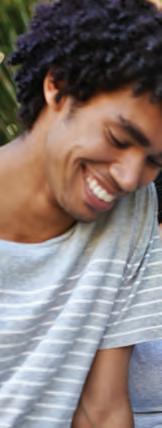
Chronicle special…Use code “Burgh” to receive a free Make Your Own Chanukah Water Globe (a $5.00 value) with a yusselsplace.com Chanukah purchase. (while supplies last)
What To Do: Buy: “The Escape Artist.” It is available at area Barnes & Noble stores and from online retailers, including Amazon and Barnes & Noble.

Email: Contact us at drullo@pittsburghjewishchronicle.org, and write “Chronicle Book Club” in the subject line. We will send you a Zoom link for the discussion meeting.
special…Use code “Burgh” to receive a free Make Your Own Chanukah Globe (a $5.00 value) with a yusselsplace.com Chanukah purchase. (while supplies last)
• Toby Tabachnick, editor of the Chronicle
• David Rullo, Chronicle staff writer
We hope you enjoy the book. PJC Toby Tabachnick
Israel will not cooperate with an FBI investigation into the killing of Shireen Abu Akleh, the Palestinian American jour nalist who died in May in an exchange of fire between Palestinian and Israeli t roops, Israel’s defense minister said, according to JTA.org.
“The American Justice Department’s decision to investigate the regrettable death of Shireen Abu Akleh is a grave mistake,” Benny Gantz, Israel’s defense minister, said on Nov. 14 on Twitter. “I made clear to American representatives that we stand behind Israeli soldiers, we will not coop erate with any outside inquiry and we will not allow interference in Israeli internal matters.”
Such an investigation is significant because the Biden administration’s State Department has already signed off on Israel’s finding that an Israeli soldier likely shot the fatal bullet, and that there was no evidence that the killing was intentional. The FBI may be ready to investigate whether the shooting was intentional, as Palestinian offi cials and Abu Akleh’s family have alleged. Gantz, who deleted and then reposted his tweets, said the Israeli inquiry was “independent and professional.”
Art Spiegelman’s “Maus,” along with six books about the Holocaust geared toward young readers, are among the hundreds of books that a handful of school districts in Missouri have reportedly removed from their shelves since the start of this school year, JTA.org reported.
The list of books pulled from shelves was published on Nov. 16 by the literary free-expression advocacy group PEN America, along with a letter of protest signed by Spiegelman and other authors.
“This is what happens when we are operating in a climate of fear,” said Jonathan Friedman, PEN America’s director of free expression and education programs.
The books were pulled owing to an amendment to a new Missouri state law, largely dealing with child trafficking and sexual abuse, that also establishes a crim inal penalty for providing “explicit sexual material” to students. The law orders possible jail time for any educators found to be in violation.
The vast majority of the affected books originated from one school district: Wentzville, a St. Louis exurb that the St. Louis PostDispatch reported had ordered its librarians to pull more than 200 books off its shelves at the start of the semester and place them under review.

Items are provided by the Center for Israel Education (israeled.org), where you can find more details.
Nov. 25, 1938 — Kfar Ruppin is founded
Kibbutz Kfar Ruppin, named for Arthur Ruppin, is founded in the Beit Shean Valley as part of the “Tower and Stockade” move ment, which uses prefab materials for rapid construction of defensible settlements.
An aortic aneurysm kills singer/songwriter Arik Einstein at age 74 in Tel Aviv. Einstein blended folk and rock music across about 50 albums and was a driving force in the devel opment of Israeli rock.
A one-day confer ence in Annapolis, M aryland, produces a joint statement from Ehud Olmert, Mahmoud Abbas and George W. Bush commit ting to direct negotiations on final-status issues toward a two-state solution.

Romanian authorities adopted a law that recognizes and gives specific protection to shechitah, or kosher ritual slaughter of animals, the Conference of European Rabbis said in a state ment, hailing the move as a “landmark” example for other countries in Europe, JTA.org reported.
The new legislation, which the Romanian parliament passed on Nov. 15, comes roughly a year after the Court of the European Union upheld the bans of both the Muslim and Jewish traditional methods of slaughter of animals for food in two Belgian states.
Jewish leaders and organizations decried the ruling, which the Israeli ambassador in Belgium called “catastrophic and a blow to Jewish life in Europe.” They have worked to lobby the European Union for protection and were heart ened last month after the EU convened Muslim and Jewish leaders for the first time to discuss ritual meat production.
Fish remains discovered at Israel’s Gesher Benot Yaakov archaeological site appear to show that humans were cooking their food hundreds of thousands of years ago, JNS.org reported.
Until now, the earliest evidence of cooking is claimed to date back about 170,000 years. However, these findings, published in Nature Ecology and Evolution, indicate that the practice is much older, dating back as far as 780,000 years.
Researchers from the Hebrew University of Jerusalem, Tel Aviv University and Bar-Ilan University collaborated with the Steinhardt Museum of Natural History, Oranim Academic College, the Israel Oceanographic and Limnological Research institution, the Natural History Museum in London and the Johannes Gutenberg University in Mainz on the research that produced this new theory.
Irit Zohar, a researcher at TAU’s Steinhardt Museum of Natural History and Dr. Marion Prevost at HU’s Institute of Archaeology, stated: “This study demonstrates the huge importance of fish in the life of prehistoric humans, for their diet and economic stability. Further, by studying the fish remains found at Gesher Benot Yaakov we were able to reconstruct, for the first time, the fish population of the ancient Hula Lake and to show that the lake held fish species that became extinct over time.”
The largest amusement park in Israel will launch in four or five years, The Jerusalem Post reported, citing N12 News.

Known as Negev Park, the project was first announced in 2011. The site already houses Israel’s largest racetrack and an aviation center.
Beersheba Mayor Rubik Daniloviz said Negev Park “will include hotels and hospitality villages, water attractions such as wave pools, an advanced amusement park and additional and diverse attractions.”
PJC
— Compiled by Andy GotliebNov. 28,
After a two-year ban on Jewish emigration from Morocco, Israel launches Operation Yachin to help Moroccans make aliyah via France or Italy. By the operation’s end in 1964, more than 97,000 Jews leave Morocco.
Nov.
By a vote of 33-13 with 10 abstentions, the U.N. General Assembly passes Resolution 181, which calls for the partition of Palestine into separate Arab and Jewish states linked by an economic union.
The U.N. partition vote the previous day not only sparks violence between Jews and Arabs in Palestine but also leads to riots against Jews in such cities as Aleppo, Damascus, Cairo, Beirut and Aden.
Dec. 1,
Israel’s first prime minister, David Ben-Gurion, dies at the Tel HaShomer-Sheba Medical Center in Tel Aviv at age 87, a few weeks after suffering a stroke. He is buried at Sde Boker beside his wife, Paula. PJC
“When I came here it almost immediately felt like home. It was the sense of community and, on a personal level, of neighborliness. I call it practical kindness. Not just saying but doing, often without being asked. And even anticipating what is needed. I give thanks every day that I am a part of this community. “


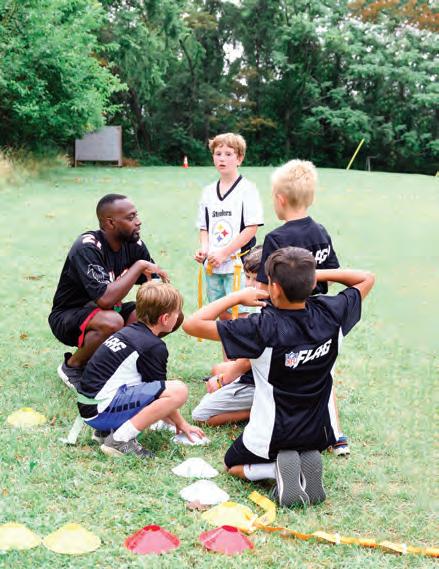
—JCC Member

Beth Pomerantz a chameleon. When she is not managing the Sisterhood Judaica Shop, volunteering at bingo or fulfilling her responsibilities as assistant financial secretary, she can often be found in the office answering phones, keeping member email addresses up to date, helping with mailings and so much more. She initiated Beth El’s condolence letter initiative and assists with yahrzeit plaque lighting. Beth is a regular Morning Minyannaire and reads Haftarah during services. Our community is strength ened by the gift of Beth’s time and talent that she shares with a smile.
Joseph Jolson been a member of Congregation Beth Shalom for over 30 years. Besides cele brating numerous life cycle events at Beth Shalom, he coordi nated the effort that led to Journey of the Spirit: Beth Shalom’s Israel Experience for Adults. He remains committed to maintaining and improving Beth Shalom’s facility and reducing its carbon footprint. Joe serves on the board of trustees, executive, finance and house committees, budget and investment subcommittees and the annual contribution task force. Our community is grateful for Joe’s efforts and congratulates him for being Beth Shalom’s Pittsburgh Jewish Chronicle Volunteer of the Year.


difficulties. We are ever grateful for Debby’s amazing involvement and leadership.
Dr. Elaine Berkowitz is the ultimate volun teer — someone who believes in a cause and puts in the effort to help make it happen.


Elaine recognized that Chabad on Campus is providing vital services for Jewish students on Pittsburgh’s campuses. She came, she joined in and she helped to make a real difference. No job is too small or too big for Elaine. Whether tables need to be set for 400 students at a Rosh Hashanah dinner, or meals need to be served to 200 students in the campus sukkah, Elaine is there to help. In her diverse life experience from being an expert dentist in Pittsburgh, to a lieutenant colonel in Iraq, Elaine brings all of her expertise into volunteering with grace and compassion. We are proud and grateful to designate Dr. Elaine Berkowitz as our

We first met Ray Dickter on Chanukah last year at the annual Cranberry Township menorah lighting.
Ever since then, he has been a huge help in our various outreach activities and events. Be it delivering matzah to Jewish homes before Pesach, assisting with our Lag Ba’omer barbecue, or helping to build our sukkah, we know that we can always count on Ray to be there for
a smile and warmth. Sheila has been an invaluable volunteer for Chabad’s vital programs serving the elderly in our community. Each week without fail she picks up flowers f or our senior care packages and delivers the flowers and smiles to different facilities every week. We are so appreciative to her for her devotion and dedication. Mazel tov to you, Sheila.
Chabad Young Professionals honors Orly Olbum as volun teer of the year. Ever since Orly moved back to Pittsburgh, she has become an active member of the CYP community. She is a member of the leadership committee, which helps steer the overall direction of CYP, and is a founding board member of JBN, the new Jewish Business Network established by CYP. It is hard to imagine the growth and success of the CYP community without her endless hours of volunteering, which has made it a success. Her pride in being Jewish and her commitment to Jewish community is second to none.

can be found in each and every issue. And the reason that the design and layout, and the overall appearance, of our Chatter is so good is because of the excellent work done by our Volunteer of the Year, Ellen Roteman . Ellen spends hours each week making sure that the Chatter has a fresh and colorful appearance. The eye appeal of the Chatter grabs the attention of our subscribers, assuring that they don’t just put it aside, but that they check out and read each and every issue. Ellen has been doing this design and layout work for more than a decade and we are proud to recognize her outstanding work and dedication by naming her our Volunteer of the Year for 2022.
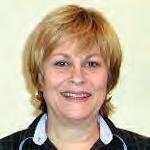
The Branch, formerly Jewish Residential Services, is proud to recognize Debby Rubin as our Pittsburgh Jewish Chronicle Volunteer of the Year for 2022.
As co-chair of the Sally and Howard Levin Clubhouse Advisory Committee and vice president of The Branch’s board of direc tors, she has devoted countless hours to the organization. Debby’s leadership is collabo rative, engaged and dedicated. The Branch is stronger with her clear thinking, knowledge and good judgment. During her time with the Sally and Howard Levin Clubhouse, she has worked tirelessly along with co-chair Jan Harris to reimagine subcommittees and energize volunteer members. This has greatly contributed to the growth of the Clubhouse in offering a warm, welcoming community, supporting adults whose lives have been disrupted by mental health
Gerri Moldovan ’s commitment to Chabad and the Jewish commu nity in Monroeville and the eastern suburbs has been tremendous. On a communal level, Gerri is an active coor dinator of the Jewish Women’s Circle events and classes. Gerri also assists with family events at Chabad and heads the kiddush/oneg committee at the shul. On a personal level, Gerri is always happy to assist people in their times of need. We at Chabad of Monroeville truly appreciate everything she does for our community.


Chabad of the South Hills is proud to honor Sheila Grenadier . Sheila is always happy to help and does so with

Stephanie Shropshire has contributed to the success of Community Day School in so many ways, taking on all volunteer opportuni ties with a smile and a can-do attitude. She is always the first to say “yes” and brings warmth and enthusiasm to our school community. Recently, she chaired the First Grade Siddur Ceremony, co-chaired Staff Appreciation Week the past four years, and serves on the CDS Parent Association leadership team. Stephanie goes above and beyond in her volunteer and ambassador roles and makes everyone feel appreciated when working with her. She feels a deep connection to the school, and we are deeply grateful for the hard work, time and energy she has given to CDS.
Like many shuls, Congregation Ahavath Achim, the Carnegie Shul, publishes a weekly newsletter. But we believe that our newsletter, the Carnegie Shul Chatter, is a cut above the rest. The reason we believe that it is such a special publication is because of the outstanding design and layout work that
The Friendship Circle nominates Joanie Isenberg as Volunteer of the Year for her time and dedication as a volunteer at our programs. We were introduced to Joanie by our professional adviser, Dr. Laura Marshak, and we are so grateful. Joanie’s lifelong background in disability and clinical mental health has made her contribution to the Friendship Circle all the more mean ingful. She has taken on a variety of roles in our adult programming and at other events, most recently at our Walk4Friendship, where she stepped in wherever she was needed. We greatly appreciate her service in supporting inclusion in our community!

Ellen Garvin is a lifetime member of Hadassah and was an active member of the Ziona and Kinneret groups for over 30 years. During this time, she served on numerous program ming and fundraising committees. Since 2000, she has coordi nated the sales of mah-jongg cards for the Pittsburgh Chapter of Hadassah directly through the National Mah Jongg League. Funds from the sales of the cards have been used for local programming events.
The mother of three Hillel Academy students, Yoni, Yaakov and Tzipporah, Rebecca Pollack joined the Hillel Academy board in 2020 and quickly became an active member.

The Pittsburgh Jewish Chronicle is proud to present the Volunteers of the Year for 2022. Their stories are incredibly inspirational. We hope you enjoy reading about the wonderful work these volunteers perform in our community.Beth Pomerantz Joseph Jolson Debby Rubin Sheila Grenadier Orly Olbum Stephanie Shropshire Ellen Roteman Dr. Elaine Berkowitz Ray Dickter Ellen Garvin Joanie Isenberg Gerri Moldovan
She has chaired the Recruitment and Retention Committee, including the creation of the Class Parent Program. The class parents create oppor tunities for parents to meet and socialize outside of the regular school setting. A mental health therapist working with the perinatal population at the Women’s Behavioral Health Clinic at West Penn Hospital, Rebecca has welcomed with a smile every opportunity to help Hillel Academy create a sense of unity among the Hillel Academy family.

Since 2017, Aaron Leaman has been a valued volunteer and member of Hillel Jewish University Center’s board of gover nors. His dedication to Hillel JUC’s vision of a world where every student is inspired to make an enduring commitment to Jewish life, learning and Israel is why he is Hillel JUC’s Volunteer of the Year. He was most enthusiastic about “boring” finance meetings during his term as vice chair of finance and his dedication to supporting Jewish college students has been evident during his term as board chair. We are thankful to Aaron for his is a longtime ambassador and strong supporter of the Holocaust Center of Pittsburgh, as well as the outgoing advisory board chair, a position she’s held since July 2019. She has guided the Center during some challenging and exciting times — including the COVID pandemic and the center’s nascent relationships with Chatham
University and Tree of Life. Additionally, Barbara is deeply involved with fundraising efforts. Barbara will remain an active member of the advisory board once she rotates away from the chair position; she also serves on the Yom HaShoah committee, helping to plan the Center’s largest annual event.
Marian Ungar Davis’ caring and compas sionate nature make her a natural fit as a Sivitz Hospice & Palliative Care volun teer. Her charm and warmth bring comfort to our hospice patients and their families during what can be a very difficult time. She knows and understands her mission and truly uplifts all with whom she comes in contact. We are grateful for Marian’s dedication to serving our community and are honored to have her as part of our JAA family.
The JCC is proud to honor Zelda Curtiss a Volunteer of the Year. “Zelda is a servantleader in the Center for Loving Kindness and AgeWell at the JCC,” Rabbi Ron Symons

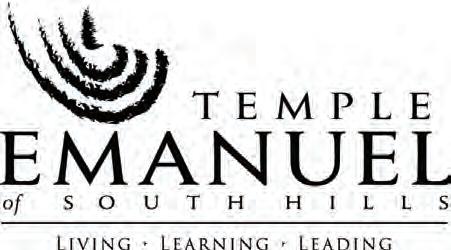


said. “You can find her at the center of an UPstander project, deeply immersed in true dialogue with neighbors and/or helping neighbors understand the value of diverse commu nity.” Zelda is a role model who describes herself as “absolutely supportive” of the JCC’s mission in serving the community. Retired after 29 years as an attorney with the Pennsylvania Department of Environmental Protection, she feels fortunate for the influ ences of her late mother, who never dwelled on the negative, and her late husband, Dr. Edward Curtiss, who, as dean of admissions at the University of Pittsburgh School of Medicine, appreciated the increasing diversity of the student body. “We have a responsibility to help others, no matter your limitations,” she said.


With a kind heart and a warm smile, Reva has helped the local Jewish Community during times of economic vulnerability. For many years Reva has been an
engaged, caring and dedicated grantor and board member. We count on her to assure that even with a small staff, we can have a big impact in the lives of members of the local Jewish community and their families by providing financial assistance every week throughout the year.
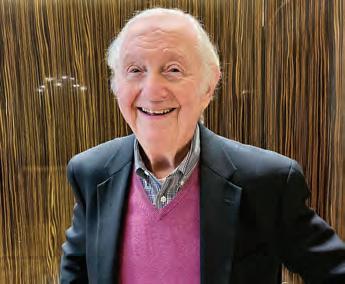



Harvey A. Wolsh , a valued and key volunteer to the many organizations he has been associated with, is president of the Jewish Cemetery and Burial Association of Greater Pittsburgh. He chairs the invest ment committee and gives direction to the association’s financial future and growing endowment. Harvey Wolsh has long been a cornerstone of the JCBA, and we are grateful to him for his sustained, tireless and exemplary leadership.
Andrew Stewart has been involved as a volunteer in the Jewish community since joining the board of the Jewish University Center in 1995. He subsequently chaired the facilities committee for the JUC during the construction of the Edward and Rose Berman Jewish University Center and went on to be president of the agency. He is an active volunteer at the Jewish Federation of Greater Pittsburgh, where he is a member of the investment committee and the past chair of the administrative, audit, investment and finance committees. Andrew is past chair of the Jewish Association on Aging and a current member of the board and execu tive committee. He also serves on the board and executive committee of Winchester Thurston School, an independent K-12 school. Professionally, he is a partner of the Silk and Stewart Development Group. Founded in 1989, Silk and Stewart has
offices in Pittsburgh and Phoenix and specializes in the development and ownership of retail, office and industrial properties.

Debra Caplan has served on the board of trustees for the Jewish Healthcare Foundation for the past seven years, including as board chair since 2021.
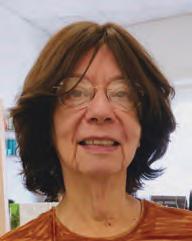



Debra has also served as the board chair of WHAMglobal, one of JHF’s supporting organizations, since 2017. Her involvement in JHF’s workforce and women’s health initiatives dates back decades to the Working Hearts campaign and early work of Health Careers Futures.
Debra’s deep commitment to JHF’s mission and the strategic leadership she provides have been essential to JHF and WHAMglobal’s programmatic and philanthropic success. The Foundation is incredibly grateful for Debra’s contributions in 2022.



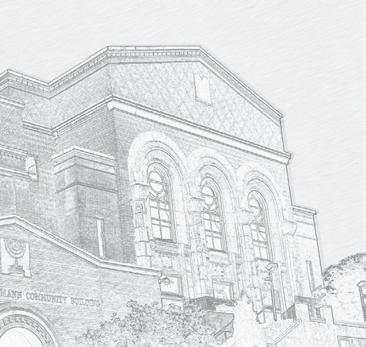
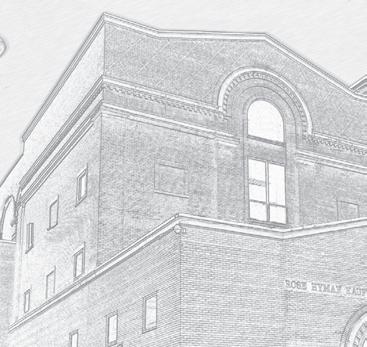
We are proud to nominate David Goldstein as Kesher Pittsburgh’s Volunteer of the Year.

Since David became involved with Kesher Pittsburgh, he has supported and guided our community in so many ways. Always asking the question “how can I help?”, no task is too great or too small. Whether arranging a piece of music or writing a d’var Torah, whether bringing his wisdom to our leadership team or helping to ensure that we embody our values for countering oppression in everything we do, our community is better and stronger because of David. Not just an all-star, he’s also a mensch, and we are grateful for the many ways he blesses us.
Simone (Sheindel) Shapiro , an active member in Lubavitch Center for many years, is the kind of woman who looks around, recognizes a need and steps in to fill it. Many times, she recruits members to help and, come what may, quietly and efficiently the job gets done. Organizing seforim, binding old to look like new, encouraging and helping to facilitate security trainings, printing user-friendly guidelines “in
case of emergency,” and most recently, the printing of the first Yizkor Memorial Book for Lubavitch Center. Simone is also an articulate and engaging teacher, teaching Pirkei Avot for women in person and during COVID, online. All of this and more is what Simone has gifted to our shul with her caring and generous spirit.

A decades-long National Council of Jewish Women volunteer, Immediate Past Board President Teddi Horvitz steered NCJW through the pandemic with aplomb, leading Thriftique, Children’s Rooms in the Courts, MomsWork and other programs. Rather than ride out the “storm,” Teddi instead engaged a consultant and led the board and staff through a realignment project that looked at NCJW’s projects and procedures through a lens of gender and racial equity. With Teddi’s leadership, NCJW continues to help meet the challenges of all working mothers and families as a friend and ally and to provide our network with educational and community engagement opportunities.

After a career spent in marketing and graphic design, over the past several years
Dan Droz has turned his considerable talents toward a new passion: Pittsburgh’s only source of Jewish news. Years ago, Dan piloted the rebranding of Community Day School, and he has been quietly providing the same guidance and talent to the Chronicle. Dan played an instrumental role in the revamping of the Chronicle’s branding and design, including digital and print. Dan was also a key part of the Chronicle’s well-received annual campaign last December, with its memorable cover of “No news is not good news.” Dan is one of the Chronicle’s biggest cheerleaders.
Hans Kumar is Pitt Repair’s volunteer of the year because he has shown up to our Sheridan Ave Orchard and Garden open volunteer night 11 times this growing season and even recruited others to join him. We love working with Hans and have appreciated his contributions — like making
huge progress on the brick pathway project, and maintenance of the in-ground beds and fruit trees. Thank you, Hans!
A fourth-generation member of Rodef Shalom Congregation, when Helen Orringer returned to Pittsburgh in 2008 after living in Toledo for 30 years, she jumped right into being active with our congregation. Orringer is a docent in Rodef Shalom’s Biblical Botanical Garden, welcoming guests and groups from Pittsburgh and beyond, and a member of Women of Rodef Shalom and the congregation’s choir, Rodef Shira. Passionate about early learning, Helen supports our Family Center Preschool as a committee member and a regular classroom volunteer. She is also deeply involved in helping with the Family Center’s fundraising efforts, which have included making soup, volunteering with their annual plant sale and also at the monthly snack bar during Outrageous Bingo. We are grateful not just for Helen’s service to our congregation, but also for her warm and compassionate presence in our community.
Temple Emanuel of South Hills is proud


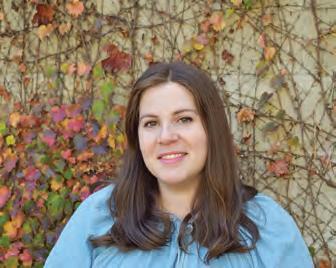
to nominate Melissa Bihary as our Volunteer of the Year. Melissa shared her professional expertise in HR management as chair of our HR committee, leading efforts to formalize our internal systems as well as guiding our hiring efforts for our interim rabbi, senior rabbi and the ongoing search process for a cantor to join our congregation. Melissa has served as both a trustee and vice president on Temple’s board.


assures that one of Temple Sinai’s longesttenured congregants, a 99-year-old who lives alone, has regular company for Shabbat dinner and a ride to synagogue whenever she wants to attend. Thank you Harton.

Temple Sinai is pleased to recognize Harton Wolf as Volunteer of the Year. Humble, committed, caring and creative, he has served continuously as Brotherhood’s leader.


Thanks to Harton’s dedicated leadership, Temple Sinai enjoys food concessions for Purim carnivals — even throughout COVID, outdoors in the pouring rain, and in frigid temperatures. From cooking Chanukah latkes and managing a kosher wine sale, to constructing the Sukkah and leading countless other activities, Harton shares his generosity of spirit with his entire congregation. Harton also

We’re delighted to Ella Rittri as our Volunteer of the Year. An alum of our school, she’s returned as a parent, teacher, and volunteer, whose tireless efforts enrich our school community in so many ways. Ella is extremely active in our school community; she has served as a class mother and has helped run the teacher appreciation committee for many years. A member of the Yeshiva Parent Association, she’s worked on multiple annual dinner committees, volunteered for our crowdfunding campaigns, and is a mentor in our Coffee and Conversation program, which provides one-on-one teen mentoring. No matter what is needed, Ella is generous with her time, her creativity and her good cheer. We are proud and grateful to have her in our school community.

Steven Santman has been a devoted member of Young Peoples Synagogue/
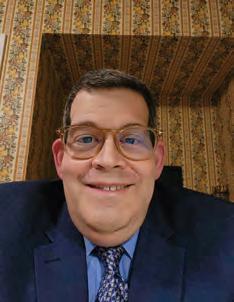
Bohnai Yisrael since 2003. He served as vice president for many years and has continued to take a leadership role helping to organize — and often leads — our religious services. Each week, before the Torah is read, he offers a brief summary of the sedrah’s content to further our understanding and enrich our experience. Steve is “always there” when a synagogue task must be done and he is an exemplary volunteer and role model for our Congregation.

It is a blessing having Charles Saul on the ZOA Pittsburgh board of directors. He has a unique approach to analyzing situations. Whether it be with advice based on his years of experience in the legal profession, interpretations of halacha, or just plain common sense, we can count on Charlie. He has become one of the guiding lights on the board. And his participation and service to ZOA is deeply appreciated. PJC

Volunteering efforts at the garden ensure nearly 500 pounds of produce are grown and donated to the East End Cooperative Food pantry.
By Adam Reinherz | Sta Writer
Hans Kumar was searching online for a volunteering opportunity. Repair the World Pittsburgh’s website popped up.


















“This stuck out as something interesting and fun,” Kumar, 25, said.




After registering with the East End-based organization, Kumar traveled to the Sheridan Avenue Orchard and Garden.

Kumar enjoyed the activity so much that he returned throughout the summer. Every Tuesday night, between 5:30 and 7:30, he joined other Repair the World volunteers. The group weeded, maintained the orchard and created a brick path for people to walk along when visiting the space.

“I had never done this much gardening before,” he said.

Thanks to the other volunteers and Repair the World staffers, Kumar had a positive and fun experience, he said. It was also important to him, though, that the organization promotes “a good cause.”
“They are growing all these different fruits and giving them to a shelter and trying to refurbish what was a terrible looking piece of land [and convert it into] something for the community,” Kumar said.

Work on the garden began about a decade ago.

Ellaisnotonlyanalum,parent,andteacher,butis alsoapassionatevolunteerwhogivesherowntimeto makesurethatYeshivaSchoolsofPittsburgh succeeds.Ellaisextremelyactiveinourschool community;shehasservedasaclassmotherandhas helpedruntheTeacherAppreciationcommitteefor manyyears.AmemberoftheYeshivaParent Association,she’sworkedonmultipleannualdinner committees,volunteered forourcrowdfunding campaigns,andisamentorinourCoffeeand Conversationprogram,whichprovidesone-on-one teenmentoring.Nomatterwhatisneeded,Ellais generouswithhertime,hercreativity,andhergood cheer.Weareproudandgratefultohaveherinour schoolcommunity!
Since then, hundreds of volunteers have transitioned the lot into a space with more than 20 fruit trees and 18 garden beds.
Weeks ago, Pittsburgh Steelers rookies William Dunkle, Connor Heyward, Kenny Pickett, Mark Robinson, DeMarvin Leal, Jaylen Warren and George Pickens, volunteered at the garden as well.
“They worked on the path to make it more accessible for the community to come and learn about food justice and participate in making food more available to the community while building relationships with each other,” Jules Mallis, Repair the World’s executive director, said in a statement.

Tending the earth is one way Repair the World seeks to better the community. Honoring the memory of those murdered on Oct. 27, 2018, at the Tree of Life building is another. Between Oct. 16 and Nov. 6, the organization partnered with the 10.27 Healing Partnership to organize commemorative service and volunteer events in memory of those who were killed four years ago.
Whether by donating blood at the Jewish Community Center of Greater Pittsburgh or packing medical supplies with Global Links, each of the service sites and projects reflected the interests and causes dear to the 11 Jews murdered at the Tree of Life building, according to representatives of the 10.27 Healing Partnership.
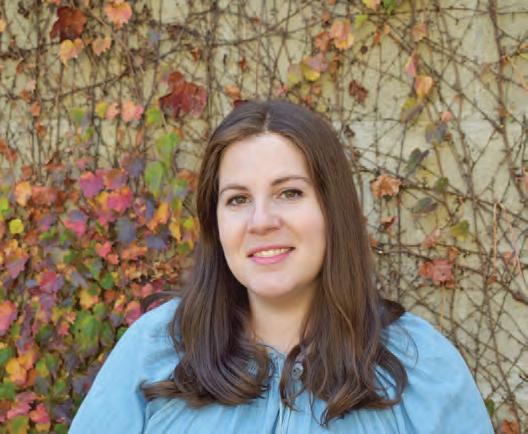
Repair the World “mobilizes young Jews to serve, builds capacity for nonprofits and deepens connection across lines of difference,” according to Repair the World officials. Those goals led Sarah E. Scherk, 29, to Pittsburgh seven years ago.
In 2015, Scherk relocated here to become a Repair the World Fellow. After completing the yearlong program, she found other ways to stay connected with the organization. Since September, she has served as a member of Repair the World’s service corps.
Service corps members work with local nonprofits up to 10 hours per week, said Annie Dunn, senior program associate at Repair the
World. Along with aiding nearby organizations, members earn a small stipend and benefit from learning opportunities.
As part of the program, Scherk works with Pittsburgh Restaurant Workers Aid, an organization that “provides resources and community support to restaurant and hospitality workers who have lost financial, housing, food and healthcare security.”
Pittsburgh Restaurant Workers Aid is run by “an all-volunteer board and one paid staff person, who is managing all the logistics of the food distribution program and all the volunteers,” Scherk said. Having a “regular volunteer, who knows the organization, and the rhythm of the work, can really free up their staff person to do other things.”
Even after the service corps program ends on Dec. 2, Scherk plans on continuing to volunteer with Pittsburgh Restaurant Workers Aid.
“I have the time and it’s a way for me to feel part of my local community, to be part of something greater than myself,” she said.
Scherk credits Repair the World with introducing her to the organization and said she hopes others are inspired to follow a similarly meaningful path.
“It can be super rewarding,” Scherk said. “You can make a difference.” PJC
Adam Reinherz can be reached at Zareinherz@pittsburghjewishchronicle.org.
We appreciate YOU and all you do, Harton!
The current deluge of mailed fund raising solicitations and the timing of Giving Tuesday are no accident — as we approach December, many of us think about our year-end charitable giving. This time of year also makes me reflect personally on the remarkable century-long evolution of Jewish Pittsburgh.
Our Jewish agencies and synagogues have been at the center of this evolution from a struggling, often marginalized group of immigrants to a thriving community, fully integrated into city life. Without donor support, these institutions would not have been able to help people facing food inse curity, to care for older adults, to educate our youth, to engage our next generation in Jewish peoplehood and to protect us from antisemitism. Charitable giving has truly made our community the model it is today.
I have had the privilege of living here and working for the Jewish Federation for over 25 years. This incredible experience has been a lesson in the power of tzedakah. Although American Jews typically trans late this word as “charity,” tzedakah really means “the obligation to do what is right and just.” This righteous obligation compels
all Jews not only to give but also to treat people with compassion. Many different factors motivate individuals to give; but all are important and form part of Jewish moral and ethical tradition.
When people give time, treasure or talent to charity, they are investing in making the world a better place. This work embodies the Jewish concept of tikkun olam, refer ring to various actions intended to repair and improve the world. This value may explain why Jews comprise a dispropor tionate number of the world’s leading philanthropists working within and outside of our religious community. Giving chari tably locally, in Israel and across the globe also strengthens our moral values and has become a major expression of our Jewish identity. Giving contributes to the idea that we are not only a local Jewish community, but a global Jewish people.
Judaism values teaching, which can include leading by example. Charitable giving sets an example for the next generation that models the value of generosity, helping others and selflessness. This behavior aims to inspire young people to continue investing in our community, helping to grow the charitable impact, and creating a legacy of giving to future generations that will keep Jewish Pittsburgh strong.
Collective impact has been at the core of Jewish life for millennia. Pooling our resources enabled Jews to direct these resources toward the most pressing needs
locally and globally. This practice has grown even more important today because pooled private giving leverages corporate, government and foundation dollars as well as enabling shared services such as security and a health plan across Jewish institu tions. Presently, for example, private giving enabled the Jewish Federation to work with the Harold Grinspoon Foundation’s LIFE & LEGACY™ program to provide funding and training for 18 Jewish agencies and synagogues in Pittsburgh to build endow ments that will sustain our community for the future. Ultimately, collective impact enables us to connect people to Jewish life, support those in need and build a safer, more inclusive world.
Our Jewish tradition also teaches the value of planning for the future. Sustaining our local Jewish institutions into the future depends largely on securing legacy gifts such as bequests, endowments or other planned gifts. No nonprofit or religious institution can survive into the future without such important sources of funding. The afore mentioned Grinspoon program makes this year a particularly good time to leave planned gifts, leveraging additional money for your favorite institution.
In Jewish tradition, we are taught that the highest form of charity is giving without the expectation of receiving anything in return and without knowing who you have helped. Nevertheless, we still get both tangible and intangible benefits when we
give. Intangible benefits include, of course, feelings of purpose, communal pride and joy in making a difference in others’ lives. The tangibles are many: income tax deductions, savings on capital gains taxes when giving securities, and reduced estate taxes when we make planned gifts in our wills or estate plans. Skilled professionals at the Jewish Federation’s Jewish Community Foundation can detail these tangible benefits.
If the timing of all those fundraising letters is no accident, neither is the strength of our amazing Pittsburgh Jewish community. The Jewish text Pirkei Avot, “Ethics of Our Fathers,” teaches: “You are not obligated to complete the task, but neither are you free to desist from it” (Verse 2:21). This call to action and rejection of apathy, even when the task at hand seems overwhelming, instructs us to push forward without knowing the outcome. Charitable giving, a vital part of Jewish tradition, has and will continue to have a profound effect on the community around us. I welcome everyone to be part of our Jewish collective and pay it forward. PJC
Brian Eglash is the senior vice president and chief development officer at the Jewish Federation of Greater Pittsburgh. He is also a chartered advisor of philanthropy (CAP) and a 21/64 next generation philanthropy advisor with nearly 30 years of experience in the nonprofit sector. For more information on charitable giving or leaving a legacy, contact Brian at beglash@jfedpgh.org.

On Nov. 8, ignoring the strong objections of Jewish and pro-Israel students, the Undergraduate Student Government (USG) of Case Western Reserve University (CWRU) in Cleveland passed a viciously anti-Is rael resolution.
In response, CWRU’s President Eric W. Kaler correctly pointed out that “the foundation of this resolution is profoundly anti-Israel and antisemitic. Passing this resolution last night undermines the safety and comfort on our campus of members of our Jewish community. … Undoubtedly, it promotes antisemitism. A vote for this resolution is clearly a vote against Israel and aggression towards the Jewish members of our community.”
It is no coincidence that the resolution was authored by Students for Justice in Palestine. This group is part of a highly organized “network of hate” financed by organizations like al-Awda, which supports Hamas and Hezbollah.
The vote was conducted by secret ballot and, as CWRU’s Hillel put it, endorsed a resolution that “falsely smears Israel, Israelis and many Jews as anti-peace.” Hillel added that the debate before the vote “like so many before it here and
on other campuses — rested on familiar and repeated antisemitic tropes.”
The USG openly ignored the voices of most of the student speakers. Hillel pointed out, “Of the 27 speakers who addressed the USG last night, 17 were proud Jewish students who advocated for their right to express their identities — including their deep connections to and support for Israel — without fear.”
The USG has a history of such behavior, and has failed even to condemn antisemitism on campus in general. This was despite the warning from USG Speaker Ethan Deemer that support for the anti-Israel BDS movement “will do nothing except create a hostile environment for Jewish students on our campus at a time when antisemitism is sharply on the rise in America.”
One Jewish student, who did not wish to be named, told CWRU’s student newspaper The Observer, “There is a direct correlation with antisemitism and a BDS bill or initiative on college campuses.” Separately, a Hillel representa tive pointed out that “at schools that have passed BDS bills, groups such as Report Campus Hate have discovered increased antisemitism. I have experienced this, having gone to a Jewish school where kids from the public school came and threw things at us — that is a real form of hate.”
Sadly, all of this is true. Scholars from the AMCHA Initiative have observed that “schools that are promoting BDS or other kinds of anti-Zionist rhetoric … are three to eight times
more likely to have incidents that target Jewish students for harm.” Such harm includes violent assault, suppression of speech and destruc tion of property.
The core issue, as Alyza Lewin of the Brandeis Center for Human Rights Under Law has written, is that it is impossible to support Jews but oppose “Zionists,” because “Zionism is an integral part of Jewish identity. … Jews share not only a faith and religious traditions but also a deep sense of Jewish peoplehood. The Jews’ history, ancestry, theology and culture are inex tricably intertwined with the Land of Israel.”
Lewin noted that, far from recognizing the nature of Jewish identity and the shocking rise of antisemitism in the United States, “today, on campus and beyond, Jewish students who demonstrate pride in their Jewish ethnic heri tage by expressing identification with Israel are shunned, marginalized and excluded. … With frightening frequency, these students are told they are not welcome unless they first condemn Israel. No other group of students is charged such a price for admission.”
Just imagine if Black students were asked to condemn Black Lives Matter or LGBTQ+ students were told to support conversion therapy as the price for admission to student spaces. Today, only Jewish students are singled out for this discriminatory treatment.
The CWRU resolution is further evidence that virulent anti-Jewish racism is being
re-normalized in American life. This new antisemitism is generally based on non-Jewish people dictating to Jews what their experience and identity should be. It also discounts the long history of discrimination and violence against Jews that culminated in the systematic murder of six million Jews.
Just as anti-Black racism is a problem that requires national action to resolve, the problem of anti-Jewish racism cannot be the sole problem of the Jewish community, which only represents about 2% of the U.S. population.
All other Americans of goodwill, and partic ularly those organizations and individuals who believe in justice and oppose discrimination, must stand against the Jew-hatred that is being perpetuated on campus and, increasingly, other spaces such as high school ethnic studies and city councils. As antisemitic hate speech and hate crimes continue to skyrocket — hitting an all-time high in 2021 — American society must confront it. History has proven that, if it does not, the consequences will be catastrophic.
As a former Clevelander and student at CWRU, I’m shocked to see a school once filled with proud Zionist allies be sucked into a vortex of hate masked as pro-Palestinian activism. PJC
Liora Rez is founder and executive director of StopAntisemitism.org, an organization devoted to exposing hatred of Jews through digital platforms. This first appeared on JNS.

This past Tuesday, the 29th of the Jewish month of Cheshvan, 50 days following Yom Kippur, the Ethiopian Jewish community (Beta Israel) in Israel celebrated their Sigd holiday. Sigd is unique to the Ethiopian Jewish community and is a holiday of rejoicing for the renewal of the alliance between the people, God and the Torah. In Ethiopia it was also a festival symbolizing the yearning for, and desire to, return to Zion. Today, as most of the Ethiopian Jewish community has made aliyah, members of the community make their way up to Jerusalem. The holiday serves as an annual gathering of the entire Ethiopian community. They see it as a chance to strengthen their affinity to their history and culture.
A few years ago, I was honored and privileged
to celebrate the Sigd holiday together with my Ethiopian brothers and sisters in Jerusalem. The Armon Hanaziv promenade in Jerusalem was filled with generations of Ethiopian Jews who had converged from all over the country to celebrate together as a community. The air was filled with the sound of the Ethiopian drums and singing as the entire community, young and old, from the white-clad elders to the hip-hop youngsters cele brated together.
The “yearning for Zion” that was such an important part of the Ethiopian Jewish tradition is recalled by Meskie Shibry Sivan, an Ethiopian Jew who arrived in Israel on Operation Moses, a dramatic emergency airlift in 1984 which brought 8,000 Jews to Israel. (This was followed by Operation Solomon, which brought in more than 14,400 Jews over one single weekend to Israel.)
“Ever since I can remember, I wanted to immigrate to Israel. However, we had not always known that the State of Israel even existed. Just the opposite – we used to think that we were the only Jews in the world and observed our tradition very closely. Our grandparents told us tales about
the Land of Israel whenever they could, making us curious about that land and yearn for it.”
As dramatic and happy as the airlifts were, many Ethiopian Jews came without the emotional, social, cultural, financial and linguistic skills necessary for an easy absorption.
It is important to acknowledge that with all of Israel’s incredible successes in many fields since its creation, there are issues that Israel grapples with as it continues to stride into the 21st century. The problems that the Jewish state faces include topics as far ranging as: security, religion, society, environment, how to harmoniously co-exist with a minority population and immigrant absorp tion. Ethiopian immigrants have especially felt the last issue, immigrant absorption. After their dramatic rescue by Israel from certain death, which was a fine example of Zionism in action, many Ethiopian Jews still feel marginalized in society. The ancient community has arrived home and started its last, but no less difficult journey — absorption. Yityish (Titi) Aynaw, Israel’s first Ethiopian Miss Israel (2013) stated that: “Martin Luther King fought for justice and
Last week, the Chronicle asked its readers in an electronic poll the following question: “What is your preferred Thanksgiving main course?” Of the 231 people who responded, 44% said “white meat,” 36% said “dark meat,” and 20% said “vegetarian or other.” Comments were submitted by 52 people. A few follow.
Dark meat is moister and more flavorful.
Stuffing is the most important food at the table for my family!
The indigenous people call the American Thanksgiving their “National Day of Mourning.” There are also almost 50 million turkeys killed for this holiday. We need to gain some perspective on this day.
Too much meat is unhealthy
We’re talking turkey, right?
I do not like turkey; I prefer salmon.
Love stuffing that is done in the turkey, but as a one-person household (and no invites for joining anyone), I haven’t had it in a few years. Rock Cornish hen with a very few sides will be my Thanksgiving dinner.
Gluten-free vegetarian.
Butternut squash.
I’m a strict vegan, so it’s vegan turkey roll stuffed with vegan stuffing.
I’ll eat most everything other than turkey. I don’t like turkey; I will eat all of the sides, but not the turkey!
Turkey (breast, thigh, or leg) with green bean casserole and cranberry sauce.
Chicken, not turkey.
Kishka.
The Pittsburgh Jewish Chronicle will be celebrating its 60th anniversary next month! Tell us, in 300 words or less, what the Chronicle has meant to you over the years.
equality, and that’s one of the reasons I’m here. I want to show that my community has many beautiful qualities that aren’t always represented in the media. Israel is a multicultural state. We’re diverse and we come from different countries, so we need to show that outwardly.”
The joyful scenes I witnessed in Jerusalem reminded me that it is a privilege to live in the era of a Jewish state which, with all of it challenges, is the actualization of that age-old Jewish dream expressed in our liturgy of the “ingathering of exiles” from the four corners of the earth. We live in an age of miracles and wonders where the hope of 2,000 years to be a free people in our land (Hatikvah) has indeed become a reality. PJC
Tuvia Book, Ph.D., born in London and raised in both the U.K. and South Africa, made aliyah at the age of 17. He is a licensed tour guide and has been working in the field of Jewish education for many years. Excerpts from this article come from his Zionism curriculum, “For the Sake of Zion, A Curriculum of Israel Studies,” (Koren: 2017). This piece first appeared on The Times of Israel.
The only turkey we like on Thanksgiving (and any other day of the year) are the live ones we see in Frick Park. Delicata squash stuffed with wild rice and lentils is our preferred main dish for a Thanksgiving meal.
Turkey generally is dry and nasty. I always prefer the sides.
Turkey (breast, thigh or leg) with green bean casserole and cranberry sauce.
I love dark meat, but I know it contains more fat. Happy Thanksgiving! PJC
Toby Tabachnick
Chronicle weekly poll question: Chronicle weekly poll question: Have you started shopping for Chanukah? Go to pittsburghjewishchronicle.org to respond. PJC
I was surprised and gratified to read the letter in the Chronicle’s Nov. 18 edition, “Most families of Pittsburgh synagogue victims support the death penalty for the shooter.”
The letter is from the families of nine of the 11 wonderful people who were slaughtered at the Tree of Life synagogue on Oct. 27, 2018, this community’s day of infamy.
I respect those who oppose capital punishment and various rationales to support their position; however, I concur with the writers of this letter that death is the appropriate punish ment for such a heinous and unspeakable act as was committed against our community and civilization. I wish that there were a functioning death penalty statue in Pennsylvania. The reality is that there is not.
Well over two decades ago, a white racist mass murderer and a Black racist mass murderer were sentenced to death for their savagery. More than 40 years ago, two individuals were sentenced to death for their local homicide spree which was dubbed “kill for thrills.” One member of that pair has since died of natural causes in prison. All of these individuals were sentenced to death under Pennsylvania law, yet the three who remain alive and on our farcical death row are unlikely to ever be dealt the ultimate punishment.
I wish it were possible for the killer of their loved ones to be dealt with in a way that would bring some peace and finality to the families whose lives were shattered by an indoctrinated antisemitic savage.
Oren Spiegler Peters TownshipSend your submission to newsdesk@pitts burghjewishchronicle.org. Your submission may be included in our 60th anniversary issue, Dec. 30! PJC
Address: Pittsburgh Jewish Chronicle 5915 Beacon St., 5th Flr., Pittsburgh, PA 15217 Website address: pittsburghjewishchronicle.org/letters-to-the-editor


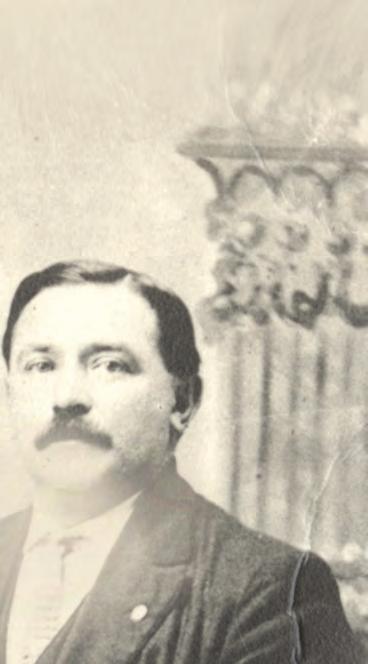



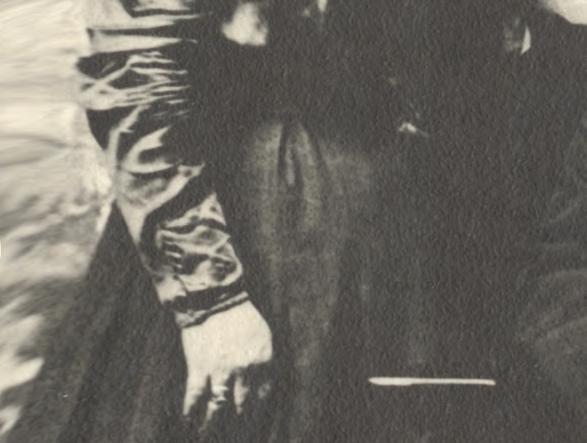



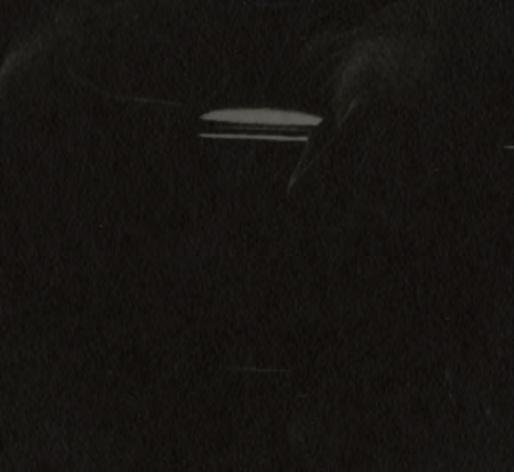

Continued from page 1
hidden and never expressed? What is repressed in the site, what is expressed in the site. No. 2 is drawing. You know architecture is about drawing an idea …. You have to create a spatial idea, which then can be translated into a more technical three-dimensional model. You draw references from the site, from the people you meet, from things you learn and from the history of the place.
You’ve created an initial design, had a public meeting, have a zoning hearing scheduled. Is the project design completed? Will there be changes?
We are far, but design is a process. Many things are bound to be transformed. Once you have the idea, though, it’s not going to change. You can develop details, but the spiritual sense of what it is has to be set at the beginning. That has to be the core.
What is the spiritual center of the Tree of Life building?
I call the spiritual center the Path of Light, which emanates from the sanctuary, trans verses the entire space of the building, connects all activities and gives a sense of center. It organizes memory, it orga nizes public spaces, organizes educational and celebratory spaces. It’s the light that organizes all of that.
There are numerous stakeholders for this new building. You have to satisfy the victims’ families, the
broader Pittsburgh community, the Jewish community. How do you satisfy everyone’s wishes?
Architecture is an interactive field, it’s not somebody sitting in an ivory tower. It’s a process that is subjective. You’re involved with many people. You have to pay attention to all the things that you come across. It’s a complex process. But I feel that in this project, there is such solidarity among the different stake holders — they might have different opinions and different views, but here is a sense of a common center, which I think is really just noble and unique in this project.
Are you still in touch with the stakeholders?
Of course. For example, the memorial, which is such a sensitive subject. This is where people actually perished. We talked to their family, to those that survived and discussed its nature. It was a very inspiring, good set of meetings where people were able to say what they wanted. I asked them: What do you want to see? That’s what my design is based on.
What parts of the original building do you plan to keep? Will the Pervin Chapel be a part of the design?
No doubt about it. We have demarcated the spatiality of the Pervin Chapel because that’s where the attack took place, as a space for memory. It’s not a nostalgic revival of that space. It is a very precise set of spatial elements that creates the sense of importance of that particular space. And, of course, the traditional sanctuary with its stained-glass window, that, of course, is there, and we’re going to reinforce it.
I think probably yes, but we don’t want to be involved in fetishizing violence in any form. We don’t want to bring attention to that sort of aspect. But we want to emphasize what is important in that space.
Do you worry about “tragedy tourism” and people visiting the site only because of the violence that took place on it?
I disagree with that. It’s not correct. I think people going to visit sites of memory is incredibly important. It’s not at all tourism, it’s important that people get to see the sites where such unspeakable crimes took place. It’s not something that you can just get in a picture, photograph, a television image or even a book. You have to go there, you have to put yourself in that space. And you have to under stand what traversed that space, and what is the future of that space. I think people should go and visit places where these unspeakable crimes took place and take it home with them.
In terms of Tree of Life, that’s very different. We’re not designing a place of sadness. We’re using memory as a hinge to show the power of the community of Squirrel Hill, the power of Pittsburgh, of the community, of the immigrants that came to Pittsburgh, of all nations and all walks of life and all ethnicities. That’s what the project is about. Celebrating freedom, celebrating liberty, celebrating the beautiful life of the city and of America, and to show what America really is. It really is an ecumenical place for everybody.
I know you’ve had success bringing people back to the World Trade Center. How can you be sure people will want to come back to the Tree of Life?
I don’t think about it. I just have to design a great space, a great place and people will come. I had people who said, “I’ll never go back to Germany.” They came back.
Jewish Pittsburgh has a lot of buildings, some with underused elements that have been incorporated into this building. Why add
The building has a new purpose. It’s not a rehash of something that already existed before. It’s thoroughly inventive, new and transformative. It’s not repeating some thing that isn’t sustainable. It’s creating sustainability.
It is my hope that it will bring solidarity. That it will be a powerful statement against hatred, against antisemitism — a statement about who we, as Americans, really are and about the beauty of what America has produced, which is not just Jewish culture, but many, many cultures have thrived here from the beginning of time. That’s what America was founded on, that principle of freedom of practicing your religion, being free, liberty and the pursuit of happiness. Those that are principles that will shine in the building. PJC
David Rullo can be reached at drullo@ pittsburghjewishchronicle.org.
Continued from page 1
charged with “keeping things up to date” at Weinberg Terrace, including contracting with vendors to prepare the apartments for residents, according to Lou Plung, chair of the JAA’s board of directors.
On May 10, 2022, the JAA’s director of human resources received an email from “an employee indicating behavior inappropriate — behavior bordering on sexual harassment by Mr. Peagler,” Plung said, stressing that no allegations of physical assault were made.
Because the JAA has a “zero toler ance policy” when it comes to allegations of sexual harassment, the JAA’s HR director “immediately called Mr. Peagler and had a meeting with him,” Plung said. Per JAA policy, Peagler was placed on immediate suspension as an investigation ensued.
Three days later, while Peagler was still on suspension, he resigned from his position.
“We obviously accepted that resignation,” Plung said, “because based on what we had been hearing, or at least finding out, we thought that there was, at least at that point in time in the investigation, enough infor mation that we were going to continue the investigation and consider terminating him.”
Shortly after Peagler resigned, it was brought to the attention of JAA management that over about two years, the organization
had paid invoices to a vendor for work that was not done.
“We believe that [Peagler] may have had a relationship with this vendor,” Plung said. “Somehow or another, he was receiving payment for that. This will all come out at the trial, we believe, when this progresses. But what we found out is, over a couple of years’ time, and really commencing with the start of COVID most heavily, he began submitting invoices — or invoices were submitted — which he OK’ed. He had the right to OK those invoices as the director of facilities, but they were for work that was not actually performed.”
Those invoices, which totaled about $50,000, constitute the most substantial part of the alleged theft from JAA, Plung said. Additionally, there were $6,000-$8,000 worth of charges to Lowe’s on a JAA credit card that “were not to benefit JAA but would have benefited [Peagler] personally.”
The JAA has taken steps to strengthen its internal controls, Plung said. Those measures include limiting access to JAA credit cards for facilities managers and a stricter review of vendors.
“We have used this as a lesson to strengthen our internal financial controls to ensure that this doesn’t happen again,” Plung said. “We’ve talked to our outside CPA firm, and they’re going to be coming in with a list of these relatively common low-level fraud maneuvers, and we are re-educating our team on exactly what to be
looking out for and strengthening all of our internal controls.”
Plung said that JAA leadership is “disap pointed and saddened that we had a trusted employee who was hired as a director of facilities in a trusted role, who, at a time we were most focused on taking care of our patients or residents — because there’s all sorts of demands with the start of COVID — used that opportunity to take advantage of the organization.”
The JAA filed an insurance claim for the sums it lost due to the alleged theft, and expects to be reimbursed for most, if not all, of it, Plung said.
Before hiring Peagler, the JAA conducted a criminal background check, as is the organization’s standard procedure, Plung said.
“That background check revealed nothing that would have prevented him from being an employee at JAA, nothing of any significance” or that was included on a prohibitive list under the Older Adults Protective Services Act, Plung said. The Older Adults Protective Services Act prohibits certain senior living facilities from hiring anyone convicted of a variety of specific crimes, including criminal homi cide, kidnapping and sexual assault.
But last year — after the JAA hired Peagler — he was charged with sex crimes he allegedly committed against a minor several years ago. His trial on those charges is scheduled for next month.
Plung said it is his understanding that the alleged sex crimes occurred in 2014. The JAA hired Peagler in 2019.
“When we did the criminal background check, this was not in the record,” Plung said. “It does not appear anywhere. My understanding is when the minor became an adult, she opened and filed the complaint. That happened subsequent to 2019. We weren’t aware of it at the hire date. We were not aware of that during the course of his employment at all.”
Plung said that regarding the charges against Peagler for sex crimes, the JAA lead ership feels “troubled, and actually, if these allegations turn out to be true, horrified by the fact of having person like that inside of our community. But there was never an allegation of that [prior to his hiring] and his role was not to interact with residents and patients on an ongoing direct basis. He wasn’t in patient care.”
“We were doing everything we thought we needed to do, including background checks, including making it very open for people to come to us when there were problems, and that’s in fact what happened here,” Plung added. “The question we have to look at is how can we even improve upon that and be more proactive?”
PJC
Toby Tabachnick can be reached at ttabachnick@pittsburghjewishchronicle.org.
What about the other spaces where the attack took place? Are you removing those in a way that they can be archived and saved for historical purposes?

The beginning of winter is the perfect time to cook up a pot of this hearty and healthy wild rice — the side dish you didn’t know you were missing on Thanksgiving.

I find sage to be one of the most underused herbs, and I adore it. Fresh sage adds depth to poultry and fish, and sage cooked with onions and lots of fresh black pepper is so warming. Toasted pecans add a crunch, while dried cranberries add brightness. Sweet potatoes sweeten this dish naturally while adding lovely color. My recipe is a beautiful choice if you prefer whole-grain foods.
Ingredients:
1½ cups of your favorite wild rice mix, precooked, using the instructions on the package
3 tablespoons olive oil
1 large sweet onion, diced
1 large clove of garlic, minced 2 large sweet potatoes, about 2 cups peeled and cut into chunks after baking ¼ cup fresh sage leaves, chopped
½ cup toasted pecans
½ cup dried cranberries
1 rounded teaspoon sea salt
½ teaspoon freshly ground black pepper, or more to taste
Wash the sweet potatoes, poke a few holes in each one using a dinner fork and bake them at 350 F for about 45 minutes. Adjust the baking time according to the size of the potato. They should feel fork-tender but not soggy, so the cubes will keep their shape once mixed in with the cooked rice. If you like, you can bake the sweet potatoes a day in advance.
Rinse the rice before cooking it. Wild rice will still seep color into the white grains and can give a brown, rust or even a deep purple hue to the pot. Cook the rice according to the package instructions without any salt or
oil. The best tip that I can give you about rice is that once you put the lid on the pot and turn the heat down to simmer, don’t touch it or stir it until the timer goes off. Don’t even lift the lid.
Once the cooking cycle is complete, remove the pot from heat and let it sit for 10 minutes, again not removing the lid. After 10 minutes, fluff the rice with a fork, and add the dried cranberries over the top before placing the lid on the pot again.
Place a heavy-bottomed pot or deep sauté pan over medium-low heat, and add the whole pecan halves. It usually takes about 5-8 minutes for the pecans to start to brown. You will smell the toasted aroma when it’s time to remove them from the pot. Set them aside to cool, and use a dry cloth to quickly wipe any residue from the pecans out of the pot.
Place the pot back over medium-low heat, and immediately add the olive oil and onions, stirring every few minutes until the onions start to brown on the edges. They should be cooked well but not caramelized so that they add a soft texture to the mix.
Once the onions are browning nicely, after about 15-20 minutes, add the salt, black pepper, fresh sage leaves and garlic. Stir constantly until fragrant, 1-2 minutes. Remove from heat, cover and let rest.
Peel and cube the sweet potatoes, measuring about 2 cups.
Roughly hand-chop the pecans.
When you remove the lid from the rice, you will see that the cranberries are plumped up nicely. Mix the rice and cran berries into the onion mixture before adding in the sweet potatoes and nuts. Mix well and serve warm.
You can make the rice a day ahead, but don’t add the sweet potatoes until it’s time to warm the rice. If you decide to warm it, I would recommend covering it with foil.
Enjoy and bless your hands! PJC
Jessica
is a home chef living in Pittsburgh.
Not all bees are black and yellow, humpback whale tails are unique, and jaguars love the smell of cologne.
While readers of Brooke Barker’s new book may enjoy dropping these facts and count less others at holiday parties, the real gift of “How Do Meerkats Order Pizza?” is a deeper understanding of animals and the scientists who study them.
Barker, who lives in Squirrel Hill, has amassed a big fan base through her illustrations and dissemination of animalrelated data. Pairing sweet drawings with straightforward text, such as, “Dwarf lemurs line their home with feces,” helped boost her Instagram account (@sadan imalfacts) to 417,000 followers. A 2016 book, also called “Sad Animal Facts,” was a New York Times Best Seller. Since then, the Congregation Beth Shalom member’s works include “Sad Animal Babies,” weekly planners and 2019’s “Let’s Be Weird Together: A Book About Love,” co-authored with her husband, Boaz Frankel.
Barker’s newest book, which publisher Simon & Schuster released on Nov. 22, allows readers to enjoy similar delights. There are hundreds of endearing illustrations coupled with humorous speech balloons imagining conversations between species. The evolu tion in Barker’s work, however, is how and where she places scientists — researchers, like Solomon David (who studies gars) and Earyn McGee (who explores lizards) are given prominent positioning.
“In the past, I’ve really just talked about animal facts,” Barker said. While she typically included references to where the information came from, the details, she said, were “buried at the back of the book, without any pictures, and it wasn’t treated like the interesting thing that I think it is.”
Now, along with informing readers that animals express themselves by gesticulating and making sounds, Barker has filled her pages with details about people like Natalia de Souza Albuquerque, an expert in animal cognition and behavior, and Ayana Johnson, a marine biologist and conservation strategist.

Spotlighting researchers is a way to let readers know there are myriad ways of supporting animals, Barker said.
Many of the people Barker interviewed for the book said that “when they were kids growing up, they loved animals and adults would often tell them, ‘Well, if you love animals you can work with them: You can either be a veterinarian or a zookeeper,’” she said.


Both of those jobs are great, Barker continued, “but it’s not really true that you can only be a veterinarian or a zookeeper. There are thousands, or maybe tens of
thousands of jobs you can do if you’re interested in animals. And there are so many ways that you can be learning about animals, and supporting animals, and being an advocate for animals that don’t involve being a veterinarian or zookeeper.”
Once one explores those paths, there’s a realization that science, and the world, is about more than discovering how many bones are in a giraffe’s neck or the number of months Antarctic midges (small flies) stay frozen, Barker said. Speaking with scientists makes clear there’s an element of “repairing and helping the planet” that drives so much of their study.
Barker will share more about her new book and what she learned from her conversations with scientists during a Nov. 30 event at White Whale Bookstore at 4754 Liberty Ave. The 7 p.m. program will include a presentation, live drawings and book signings.
Until then, readers — regardless of profession — can help, she said: When rivers dry up and winters get warmer, life changes for animals. There are “things we can do as people to learn more about our planet — where we’re so lucky to live — and how we can make the world a better place for the animals that are here [and] also just for people who will continue to be here.” PJC



Adam Reinherz can be reached at areinherz@pittsburghjewishchronicle.org.











Working with Marks Elder Law Marks Elder Law when planning for your family’s future can help you make better decisionskeeping more of your money during your lifetime





Crafting strategies that allow you to keep more of your assets during your lifetime;


Exploring the many payment options for disability and longterm care services;
Designing instruments that protect your assets from Medicaid spend-down requirements;
Ensuring that your affairs will be handled the way you want if you experience a serious injury or illness; and
Administering your estate to ensure proper distribution of your assets while minimizing any taxes owed.
We help families understand the strategies strategies, the benefits benefits, and the risks involved with elder law, disability law and estate planning.
p Illustration from “How Do Meerkats Order Pizza?”
www.marks-law.com
With great joy and happiness, Melanie and Andrew Mendelson announce the birth of their daughter, Ellie Parker Mendelson, on Sept. 30, 2022. Ellie is the granddaughter of Gary and Sharyn Protass of Roslyn, New York, and Wayne and Debbie Mendelson of Marlboro, New Jersey. Ellie is the great-granddaughter of Carol Lazear, of Pittsburgh and Barbara Protass, of Long Island, New York. Ellie Parker is named in loving memory of her great-grandfathers, Paul Lazear and Harvey Protass. The family, including their dog, Nittany, currently reside in Charlottesville, Virginia.


Ryna and Naftali Lustig of Croton on Hudson, New York, announce the engagement of their son, Elliot Jonah to Talia Niederman. Talia is the daughter of Steve and Carolyn Niederman of North Bergen, New Jersey. Both Elliot and Talia are graduates of Brandeis University and are currently working in Washington, D.C. on environmental-related issues. Elliot is the grandson of Sondra and Richard Glasser and the late Edward Izenson. A fall 2023 wedding is planned in the Hudson Valley. PJC

In this week’s parsha, Toldot, we read how Isaac realizes that he is getting older and may not have much longer to live. He summons his son Esau and asks him to hunt game and prepare a meal of delicacies for him, explaining that he intends to partake of this special meal and then give his son a blessing. Isaac’s wife, Rebecca, overhears this conversation and, while Esau goes out on this task, Rebecca tells her other son, Jacob, of Isaac’s intent. She urges Jacob to prepare the same feast for his father and to impersonate Esau in order to receive the blessing instead. Jacob and Rebecca tend to the details of the plan to fool Isaac and, shortly after Jacob appears, disguised as Esau, Jacob presents Isaac with the meal of delicacies. Isaac believes that Esau has returned and he gives his son the blessing, not knowing that it is Jacob who is receiving the blessing instead.
Just after Jacob leaves his father, Esau arrives on the scene with the required delicacies, expecting to get the blessing from his father. Isaac tells him that he already had the meal and has blessed the person who brought it. Esau is very upset and says to his father, “Bless me, too!” As Isaac realizes that it was Jacob who took the blessing, Esau becomes more agitated and asks his father again, “Have you not reserved a blessing for me?” Isaac answers that he has already given his blessing and
that he cannot do anything about it. Esau, increasingly distraught, begs his father for the third time, ”Have you but one blessing, Father? Bless me, too.” Isaac finally answers his son Esau with a blessing. In this story, not unlike others in the Torah, we see a confrontation of brother against brother. Unresolved problems among members of a family can affect everyone in the family constellation, not just the major players. Isaac is clearly in pain when he realizes that he has been duped. Jacob was uncomfortable with scheming to receive a blessing through trickery. And poor Esau had to plead three times for a blessing from his father. Isaac finds a blessing for him, but how much sweeter it would have been if it were more readily given!


Blessings are precious, and they touch our hearts. They don’t necessarily need to be saved for certain occasions and doled out sparingly. Spontaneous blessings are special, too. Perhaps we should not wait until the last moment or a necessary moment to share a blessing, especially with people in our own family who mean so much to us. Anyone can give a blessing anytime, and it will uplift the giver as well as the receiver. The story of how Esau has to beg shamelessly for a blessing reminds us to give blessings freely and frequently to those we love.
Today begins the new month of Kislev, in which the light of the Chanukah candles will glow in the faces of those who are close to us. May the light of the blessings you give also glow in the hearts of your family members this month and every month. Shabbat Shalom and Chodesh Tov. PJC
Cantor Rena Shapiro is the spiritual leader of Beth Samuel Jewish Center.



KRIEGER: Donald M. Krieger was born in Pittsburgh in 1939 and died peacefully at home. He grew up in Squirrel Hill and attended Linden School, Taylor Allder dice High School and the University of Pittsburgh. He started dating Miriam in high school and they married in 1961. He worked as a teacher and later as a guidance counselor. After he retired, Don and Mir iam enjoyed traveling, playing Rummikub and spending time with friends and family. Don and Miriam raised their family on Hastings Street, close to his parents, sister, in-laws and extended family. With four children and many dogs and cats over the years, the house was always full of games, food, sports and pets. He enjoyed playing foot ball and Frisbee with his children when he got home from work, and loved watching the Steelers on Sunday. Being surrounded by generations of ex tended family meant lots of celebrations and holiday get-togethers, including Passover seders. On hot summer days, Don enjoyed cramming the family and friends into the station wagon for trips to Keystone Lake State Park. The annual pilgrimage to Wildwood, New Jersey, was a highlight for the whole family. He loved visiting his children in Baltimore, California and on Maui, and connecting with his grandchildren. He is survived by Miriam, his wife of 60 years and the love of his life, along with his children Barry (Judy), Lee, Jeff (Daniela), and Susie (Ken). His grandchildren — Caledonia, Hadassah, and Willa — will remember his “dad jokes” and Pictionary prowess. He will be missed by many nieces and nephews, including Mindy, David, Rick, Bel la Joy, Harry, Brian, Essie, Harold, Lori, Bobby, Jeannie, Tzipi and Zevick, and by long-time friends and new friends. Graveside service and interment were held at Tree of Life Memorial Park. Arrangements entrusted to Ralph Schugar Chapel, Inc., family owned and operated. schugar.com
Anonymous
Sylvia
Sherwin F. Glasser




Edward M. Goldston. . . . . . . . . . . . . . . . . . . . . . . . . . . . . . . . . . . . . . . . . . . . . . . . . . . . . . . . . . .
Edward M. Goldston. . . . . . . . . . . . . . . . . . . . . . . . . . . . . . . . . . . . . . . . . . . . . . . . . . . . . Fruma Chaya Leebov

Mrs. Gomberg
Cindy & Harold Lebenson

Merrianne Leff
Mollyann March Howard J. Green
Anonymous
Anonymous
Ritholz
Gary Rothman
Edith F. Schneider


Edith F. Schneider Ruth Hirsch


Edith F. Schneider Max Hirsch
Edith F. Schneider Ida Kaplan

Edith F. Schneider

Edith F. Schneider
Sunday November 27: Miriam Abramovitz, Martin Bass, Bernard Israel Bernstein, William Finkel, Samson Finn, Hermina Gropper, Lillian Karp Grossman, Goldie Handelsman, Celia Harris, Anna Miller, Harriet M. Nicholson, Harry Seiavitch, Sarah Silberblatt, Goldie Stein, Irving Troffkin, Sylvia S. Vinocur, Molly Weiss

Monday November 28: Irving Broverman, Abraham J. Caplan, Sam A. Caplan, Dr. Samuel Cirota, Louis Daniels, Harry Gomberg, Bernard J. Grinberg, Isadore Kurfeerst, Esther Cohen Lubovsky, Dorothy Miller, Leah Rosen, Rae F. Schwartz, Sara Schwartz, George Stern, Frances Turk

Tuesday November 29: Hyman Balis, Bessie Glantz Bauman, Martin A. Berezin, Norman Black, Charles G. Brown, Dr. Frederick Carlton, Joseph Chernovitz, Abe M. Cohen, Esther Eisman, Carle Joseph Enelow, Yetta Gerson, Selma Jeremias Kostova, Abe Kotovsky, Susan Lippard, David Isadore Mandelblatt, Seymour H. Miller, Irving Nixon, Anna E. Reubin, Sidney Rosenfeld, Fannie Katzman Rubenstein, Walter Sigel, William Weinberg, Florence Bella Wolf
Wednesday November 30: Hannah R. Adler, Shirley Ankin, Minnie Berkovitz, Wilfred Irwin Berman, Bernard Caplan, Harriet Friedlander, David Glick, Gerald Goldberg, Mildred Levinson, Sadie Levy, Celia Maglin Lupovitz, Samuel Margolis, Louis Rapport, William Rosenbloom, Charles Saltsburg, Thelma Sapir, Freda Schwartz, Samuel F. Shaeffer, Michael Supowitz, Elizabeth Kramer Swartz, Solomon Weinstein, Robert H. Wolf, Leo Arthur Zober
Thursday December 1: Max Cohen, Helen Pearl Cushner, Max Engelberg, Arthur Firestone, Annie Friedman, Gertrude Glasser, Samuel Morris Goodman, Evelyn B. Letwin, Norman H. Marcus, Rosa Rokhkind, Jeannette Samuels, Mildred Schoenberger, Samuel Silverman, Jean Walters
Friday December 2: Joseph Bardin, Ida G. Barniker, Emma Eligator, Nathan Granoff, Abe Herman, David Kaufman, David Klein, Fruma Chaya Leebov, Rachel Levy, Rose Rosenberg, Lucy Sachnoff
Saturday December 3: Benjamin Aberman, Cecelia Edith Greenberger, Milton E. Helfer, Sarah Herring, Bertha Brown Horovitz, Samuel Kaufman, Adolph Lefkowitz, Bessie Jenoff Lincoff, Dorothy Margolis, Lester Marshall, Harry Meyers, William Rakusin, Charles Ruttenberg, Israel J. Saul, Louis David Simon, Judy Smalley, Samuel Westerman

Jewish community in our city.”
“This was not an idle threat,” Adams said. “This was a real threat.”
 By Jacob Henry | JTA
By Jacob Henry | JTA
Atip from a Jewish security organization helped lead to the arrest of two suspects Saturday in connection with online threats to attack a New York City synagogue.
The Community Security Initiative, a group created by UJA-Federation of New York and its affiliated Jewish Community Relations Council, discovered threatening tweets on Friday morning and brought the information to law enforcement, according to a UJA spokesperson.
In a news conference at City Hall on Monday, UJA CEO Eric Goldstein said that after they shared the lead with the New York Police Department and the Federal Bureau of Investigation, law enforcement “immediately sprung into action.”
New York City Mayor Eric Adams said during the news conference that Metropolitan Transit Authority police officers arrested the suspects — Christopher Brown, 21, of Aquebogue on eastern Long Island and Michael Mahrer, 22, of Manhattan — at Penn Station, adding that they had “an alleged plan to murder members of the
Adams added: “Hate is on the rise in America. This hate cannot be allowed to take hold and build and gain further ground. We must reject the hate and the division that drives it.”
On Sunday, Gov. Kathy Hochul, responding to the arrest and Saturday night’s deadly shooting at an LGBTQ nightclub in Colorado, said state police would increase surveillance and protection efforts at synagogues and other vulnerable sites.
Steve Weill of Flatbush Shomrim, a Jewish community watch organization in Brooklyn, said at the press conference that he received a call on Friday night from NYPD Inspector Ritchie Taylor, an Orthodox Jew, who advised him that there was “a credible threat to the community.”
“We put a plan in place where hundreds of trained volunteers would reach all the syna gogues and all the houses of worship in the areas and warn them,” Weill said.
The suspects were caught before that plan was implemented. Weill added that the Jewish community has “an unprecedented relation ship” with Adams.
“The information that flows is incredible,


Budget cuts will cause Birthright Israel to cut up to one-third of its trip participants in 2023 and beyond, the organization announced on Monday. Citing inflation and rising travel expenses that have increased the per-person cost of the experience to $4,500, Birthright stated that it is “now seeking contributions from the wider American-Jewish community to maintain the organization’s provision of the critical program” that provides free 10-day trips to Israel for Jewish young adults.
“The significant cost increases of our program mean that we will not be able to accommodate as many applicants in the coming years, and we know that those who miss out on a Birthright trip are unlikely to travel to Israel at all,” Birthright Israel CEO Gidi Mark said in a statement. “There has never been a more critical need for Birthright Israel than now. Without a major immediate increase in fundraising, we will be
hard-pressed to have the positive effect we’ve had on many individuals — and that will inev itably impact American Jewish organizations that are used to seeing enthusiastic young adults return from Israel and take major roles in the Jewish community. On average, nearly 60% of communal professionals in the U.S. are Birthright alumni.”
Birthright Israel Foundation President and CEO Izzy Tapoohi said there is a misconception that Birthright “is funded by just a few large donors, including the government of Israel and the Adelson Family Foundation.”
“Birthright Israel Foundation’s support comes from donors at all levels, from alumni and parents to mid and large donors and today we call upon the entire Jewish community to help us maximize the number of future participants who can begin their Jewish journey on this critical program,” said Tapoohi.
American Jews who attend Birthright trips are 160% more likely to have a spouse who is Jewish, according to recently published analysis by the Cohen Center for Modern Jewish Studies at Brandeis University. PJC

that we can get such sensitive information and that they can have the trust in us to relay that to the community in a calm and professional manner,” Weill said.
The Daily Beast reported that the NYPD intel ligence division had become aware of Brown’s tweets talking about “shooting up a synagogue and dying.” MTA police, state police, the NYPD and the FBI Joint Terrorism Task Force worked together on the investigation, according to Hochul’s office.
According to the Daily Beast, the hunt for Brown led police to an apartment on West 94th St. in Manhattan, where his acquaintance Mahrer was said to live with his parents. Neither Brown nor Mahrer were at the apartment, but detectives found a backpack with a Glock semi-automatic pistol and ammunition. In an intelligence alert, police said Brown had “a history of mental illness.”
What police described as a white supremacist Twitter group operated by Brown was taken down. After being caught, Brown was held on a weapons charge, and Mahrer was charged with illegal weapons possession. Each pleaded not guilty to state charges and are scheduled to appear in court on Nov. 23.
The New York Post reported that Mahrer is
Jewish and the grandson of a Holocaust survivor. UJA-Federation of New York and the JCRC of New York created the Community Security Initiative after the deadly attack at the Tree of Life synagogue building in Pittsburgh in 2018. CSI helps provide protection and safety training to Jews and Jewish institutions in New York City, Westchester and Long Island.
The arrests come just weeks after the FBI warned synagogues in New Jersey about a “cred ible threat” made to them; the NYPD heightened security at city synagogues as a precaution. The FBI later announced that a 19-year-old man who said he had sworn allegiance to ISIS had been arrested for making the threat.
The arrests also come a time of heightened anxiety about antisemitism in New York City and beyond. The NYPD has recorded an increase in the number of reported antisemitic incidents.
Meanwhile, celebrities Kanye West and Kyrie Irving have ignited concerns about antisemitism with their comments and tweets, and turmoil at Twitter has fueled a rise in hate posts, including about Jews, according to watchdogs who monitor the social media platform. PJC
This article first appeared on the New York Jewish Week.




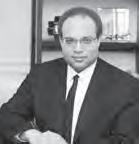


























LAWRENCEVILLE - $635,000 - MOTIVATED SELLERS 721 53rd Street. A stunning Lawrenceville home o ers 4 levels of luxurious finishes and unparalleled city views. The dazzling hardwood floors and an open-concept layout make living and entertaining easy. The kitchen is a chef’s paradise with stainless steel appliances, Glacier White Quartz countertops, a large island with seating, and crisp white kitchen cabinets elevated with a pop of color from the handmade backsplash tiles and mosaic inlays. Three spacious bedrooms, 3.5 contemporary-styled baths, and thoughtful storage throughout. The top-floor bonus room features French doors to a private balcony with exceptional vistas of downtown and beyond. Enjoy the convenience of dedicated 2-car garage parking equipped with an EV charging outlet. Convenient to public transportation, the Universities, Hospitals, High-Tech corridors, restaurants and shopping. LERTA Tax Abatement.

SHADYSIDE • $695,000





North Woodland Rd. Townhome. Unique custom built sophisticated 4 levels. Lower Level has a great wine cellar, storage, int garage, and a side room which could be an o ice. First floor has a great room kitchen, dining and living area, plus 1/2 bath. This room leads to an unbelievable courtyard and luscious grounds with a sprinkler system. Next level- large room with a whimsical full bath. Top level has a great master area, with master bath and laundry, Smashing steel and glass staircase, dramatic lighting. Terrific acrhitectural details.
FOX CHAPEL • $549,000 564 Dorseyville Rd
FIRST TIME OFFERED! One of a kind on over an acre, just 15 minutes from town. Pegged Post and Beam construction. Walls of windows, open concept,
When David Aschkenas goes to snap a photograph, he knows exactly where — and how — to look.
“I’ve been doing photography for — next year, it’ll be 50 years,” said the Highland Park-based Jewish photographer, a former film student who bought his first camera back in 1973. “As soon as you walk into a space, you see the light, the architecture, and you pretty much know what you want to do.”
“You get into a spot,” he added, “and you just know.”
Aschkenas’ intuitive work, which seems to give viewers a measure of control over where they’re looking, will be on full display at an upcoming gallery show.
Mendelson Gallery, 5874 Ellsworth Ave., Shadyside, will feature Aschkenas’ “Italian Synagogues and Churches,” a pet project a decade in the making, on Saturdays and Sundays in December from noon to 4 p.m. The gallery will hold an event to mark the exhibit opening on Wednesday, Nov. 30 from 5 to 8 p.m.
About 10 years ago, Aschkenas got approval to photograph synagogues in Prague, a city whose historic relics survived the bombings and destruction of World War II. Little did Aschkenas know that it was the beginning of a new chapter of his work. He soon was traveling throughout Europe, shooting photos of synagogues and churches, some of them dating to the 12th century.
To listen to Aschkenas talk about the buildings he photographs is to relish the little details.
Recently, he looked at Moorish tilework in a picture of a synagogue in Florence, Italy, built circa the 1880s.

“Talk about patterns!” Aschkenas enthused. “Every nook, every surface!”
Or, there was the Italian church from 1360.
“There’s nothing like a few hundred years of weathered patina to give it that look,” he raved.

Though Aschkenas has photographed worship spaces in the Czech Republic and the Netherlands, something special rever berates in his work shot in Italy. He has photographed synagogues and churches in at least four Italian cities: Venice, Sienna, Florence and Rome.
“In Rome alone, there’s 800 churches,” Aschkenas said. “Every block you go into, there’s a church.”
The synagogues, though, especially compared to more modest American
versions, are awe-inspiring: delicate inlaid woodwork, careful tiling, the appearances of faux-marble and gold. Some of the shuls also had stories. He went into one synagogue in the Jewish section of Prague where a religious leader said the golem — a clay, anthropo morphic creature supposedly brought to life in Jewish folklore — went to rest.
“I was in this place, locked in and the golem’s supposed to be upstairs,” Aschkenas laughed.
The Shadyside show where his paint ing-like photos will be displayed will feature 28, 24-inch-by-36-inch color prints — 14 of synagogues, 14 of churches.

Aschkenas looked recently at one of his photos of a Florence church from the 14th century.
“Look at that floor — it really is mindboggling,” he laughed. “How’d you build this 400, 500 years ago?”

Aschkenas’ sense of awe permeates the work — and is a treat for someone looking to get an inside glimpse of the interiors of European worship spaces.
“Every one I go into,” Aschkenas said, “it’s unbelievable to me.” PJC



The


Teens

